Special Report
50 of the Oldest Things on Earth
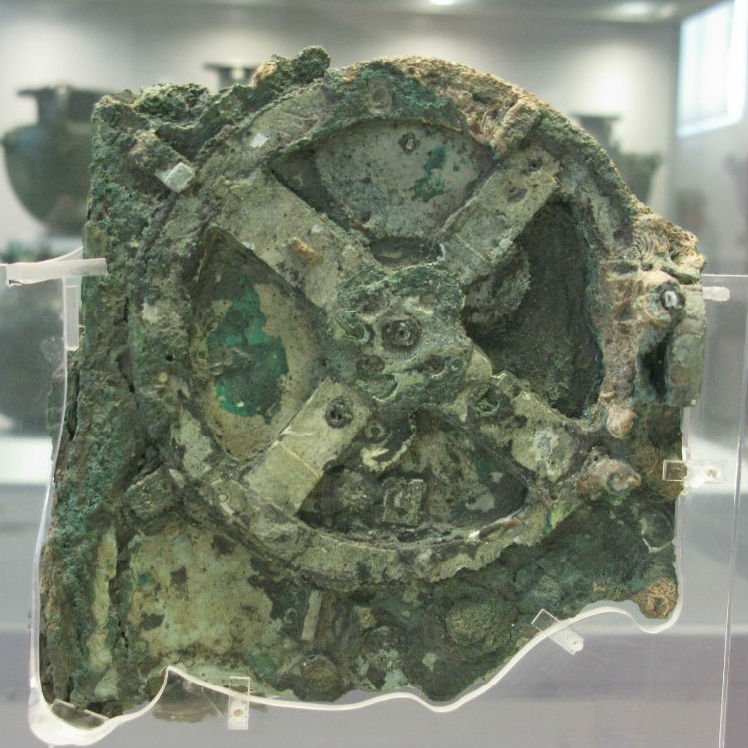
Published:
Last Updated:

From family heirlooms to antiques shops to museums, many Americans share an obsession of the extremely old. This includes man-made artifacts such as a 130,000-year old piece of jewelry and natural relics such as the fossilized remains of a Nyasasaurus found in Africa believed to be the oldest dinosaur fossil on Earth.
24/7 Wall St. recently brought you 25 examples of the oldest known artifacts in a given category, such as wine bottles, maps, and bridges. Now, we’ve added 25 new items. The list now offers a glimpse at 50 of the oldest things in the world. We compiled a diverse list, drawing from modern invention such as automobiles to the oldest known star, which predates our own planet by billions of years.
While history books can remain abstract, these relics give us a tangible peek into another time. The early cave paintings, like the 40,000-year-old ones in El Castillo, Spain, lack some of the later-developed perspective techniques and drawing tools. Thousands of years later, we see the earliest example of panel paintings, which are the precursor to classic work from painters like Picasso and Van Gogh.
Click here to see 50 of the oldest things in the world.
In other cases, mankind’s first attempts at art, photography, architecture, and music can be either beautiful in their simplicity or impressive in in their ingenuity. The earliest known photograph, Nicéphore Niépce’s “View from the Window at Le Gras,” isn’t a beautiful landscape or a poignant look at a subject. But capturing the first image paved the way for entirely new ways for people to express themselves.
Of course, many of the oldest items on earth do not invite any artistic analysis because they were either around long before humanity was around or because they are naturally created. This includes the oldest tree, which is over 5,000 years old, and the oldest known rock, which is slightly older than that — by about 230 million years
24/7 Wall St. reviewed scientific journals, record collecting organizations, newspapers, and other sources to identify the oldest known item in each of a number of categories. Often, there is less than a historical or scientific consensus as to which is the actual oldest item. These are not necessarily the first item made in a particular category, rather, they are the oldest surviving version.
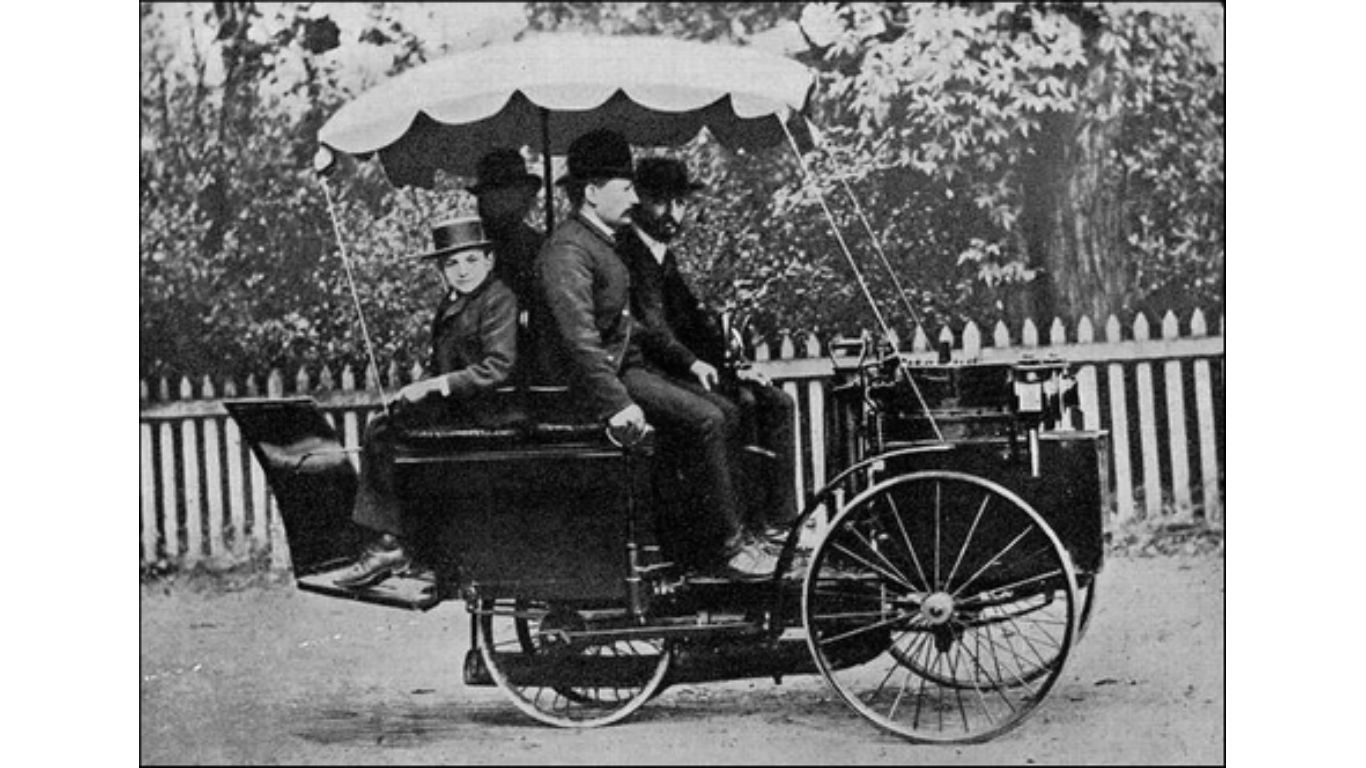
1. Automobile
> Oldest: The De Dion-Bouton et Trepardoux Dos-a-Dos Steam Runabout, La Marquise
> Approximate Date: 1884 A.D.
> Location: France
Dubbed “La Marquise,” this steam-powered vehicle still functions today and is the world’s oldest operating automobile. The four-wheeled contraption, which was built during the Victorian era for a French aristocrat, is equipped with a tiller instead of a wheel and could reach a top speed of 38 miles per hour. La Marquise won the world’s first car race in 1887. It was sold at auction in 2011 to an unnamed buyer in Hershey, Pa., for $4.6 million.
[in-text-ad]
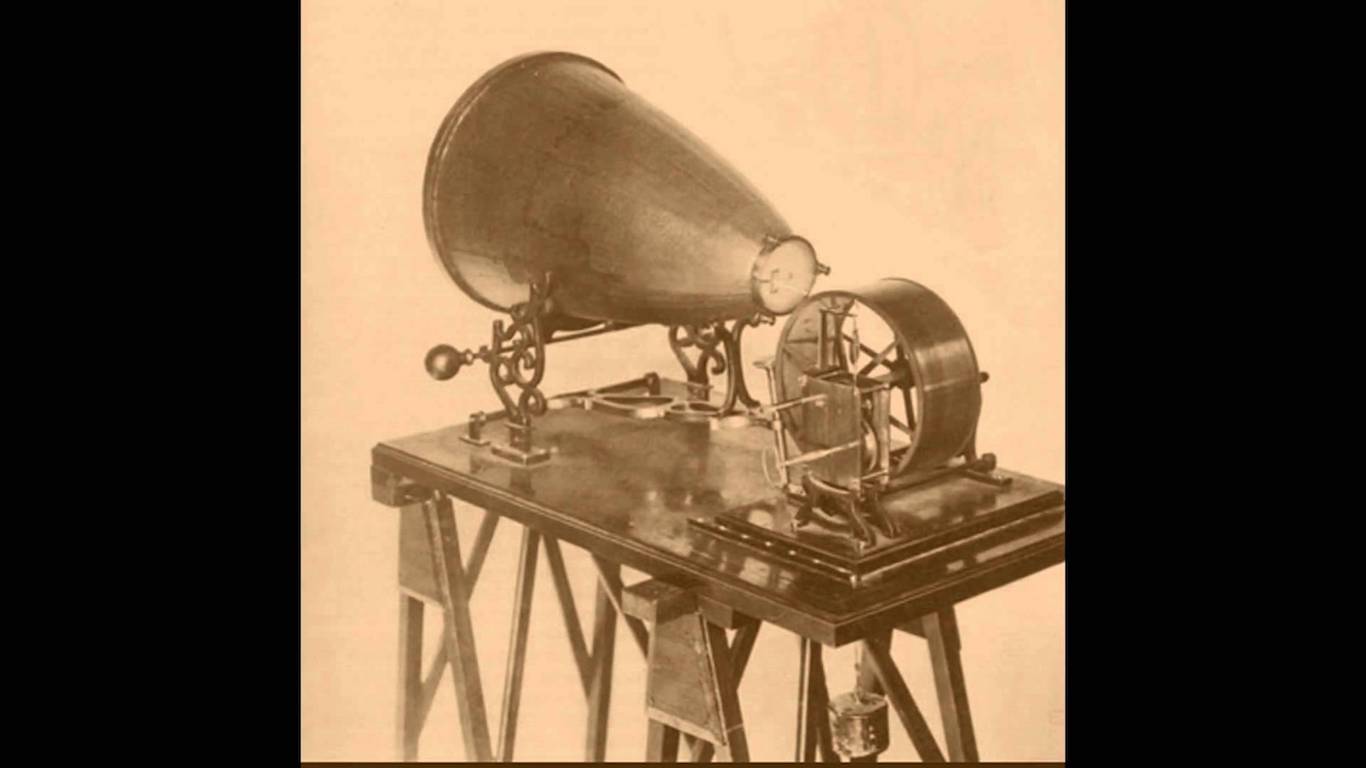
2. Recording
> Oldest: Édouard-Léon Scott de Martinville, “Au Clair de la Lune”
> Approximate Date: 1860 A.D.
> Location: Paris, France
Many people believe Thomas Edison invented recorded sound, but it appears that a French inventor named Édouard-Léon Scott made the breakthrough several years earlier. Scott patented his phonautograph in 1857. It is believed that Scott himself sang a part of the French folk song “Au Clair de la Lune” into his machine in 1860, creating the first known musical recording. Scott’s phonautograph and recordings weren’t discovered by historians until 2007.
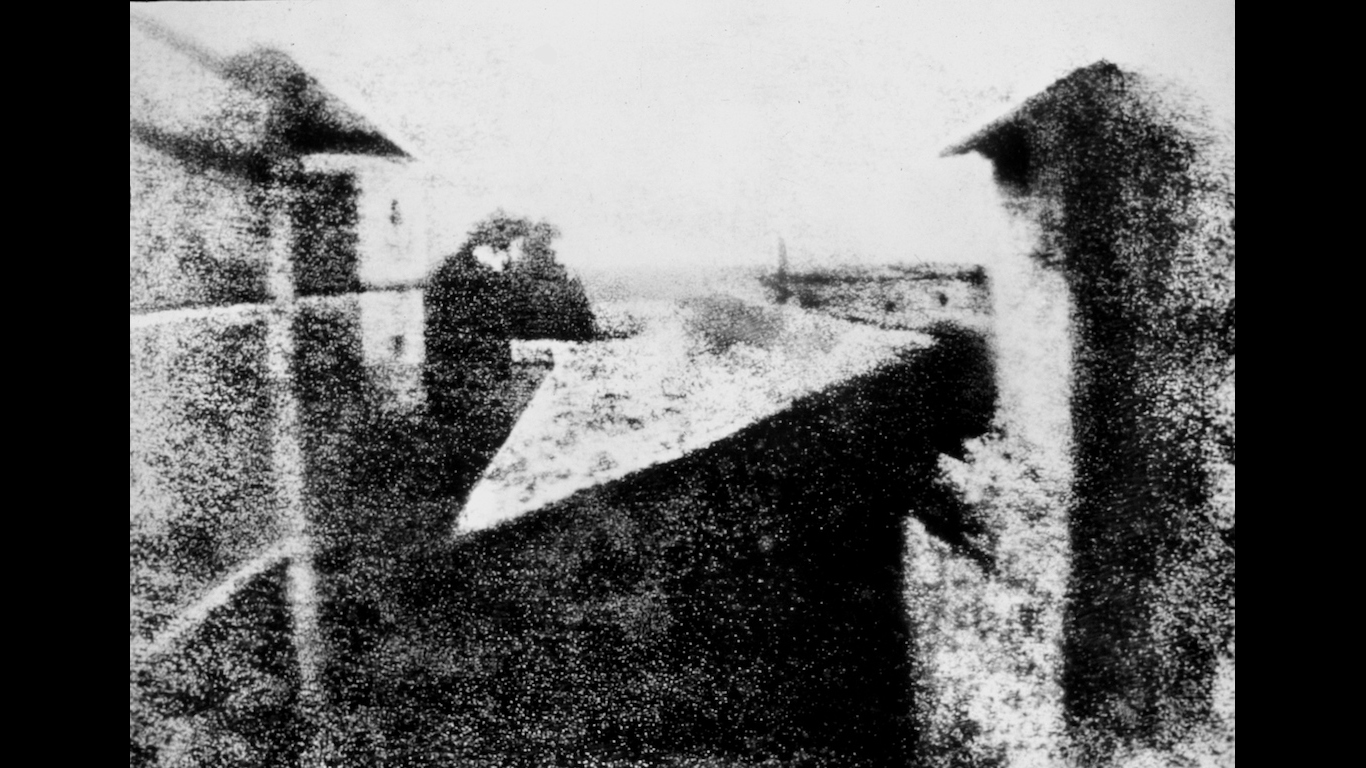
3. Photograph
> Oldest: Joseph Nicéphore Niépce’s “View from the Window at Le Gras”
> Approximate Date: 1826-1827 A.D.
> Location: Saint-Loup-de-Varennes, France
Though it’s not as clear as the photographs we see today, Joseph Nicéphore Niépce’s “View from the Window at Le Gras” was an astonishing development in technology. Likely taken in 1826 or 1827, the photo shows Niépce’s estate in Burgundy, France. Niépce actually captured another image in 1822, but his “heliograph” of an engraving of Pope Pius VII was destroyed when he tried to copy it years later.
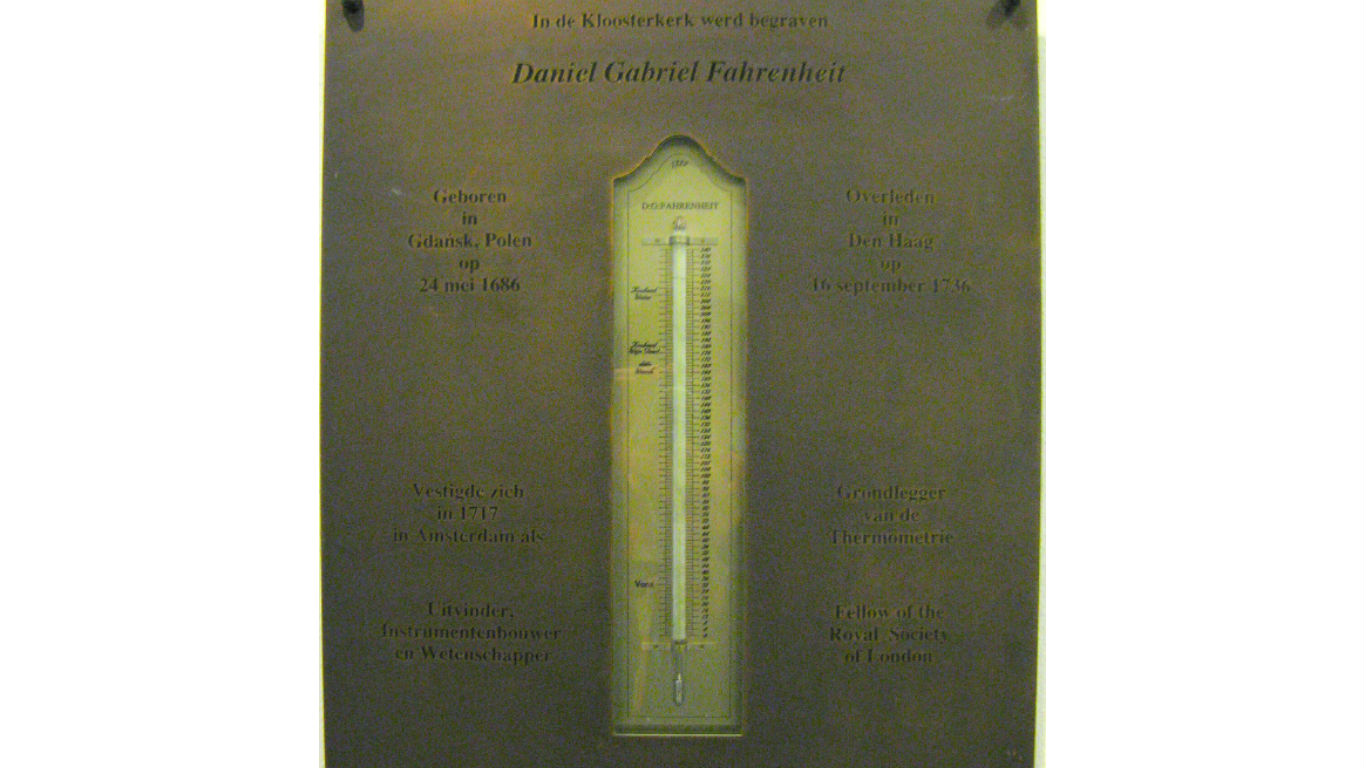
4. Thermometer
> Oldest: Fahrenheit’s Thermometer
> Approximate Date: 1714 A.D.
> Location: Germany
German physicist Daniel Gabriel Fahrenheit invented the mercury thermometer that we place under our tongue to this day to check if we have a fever. The thermometer used a standardized temperature scale — and later the Fahrenheit scale — for accuracy. Galileo Galilei and Santorio Santorio had created the forerunners of the thermometer. That instrument was called a thermoscope, and it was not accurate. Fahrenheit first invented the thermometer in 1714 and the oldest surviving one, believed to be from 1718, was sold at an auction for £67,000 in 2012.
[in-text-ad-2]

5. Telescope
> Oldest: Dutch Golden Age Telescope
> Approximate Date: 1608 A.D.
> Location: The Netherlands
The world’s oldest working telescope, dating back to the early part of the 17th century, was found in the Netherlands in 2014. The small, cylindrical device was discovered while workers were digging a railway tunnel in Delft in South Holland. The invention of the telescope is credited to German-Dutch eyeglass maker Hans Lippershey.
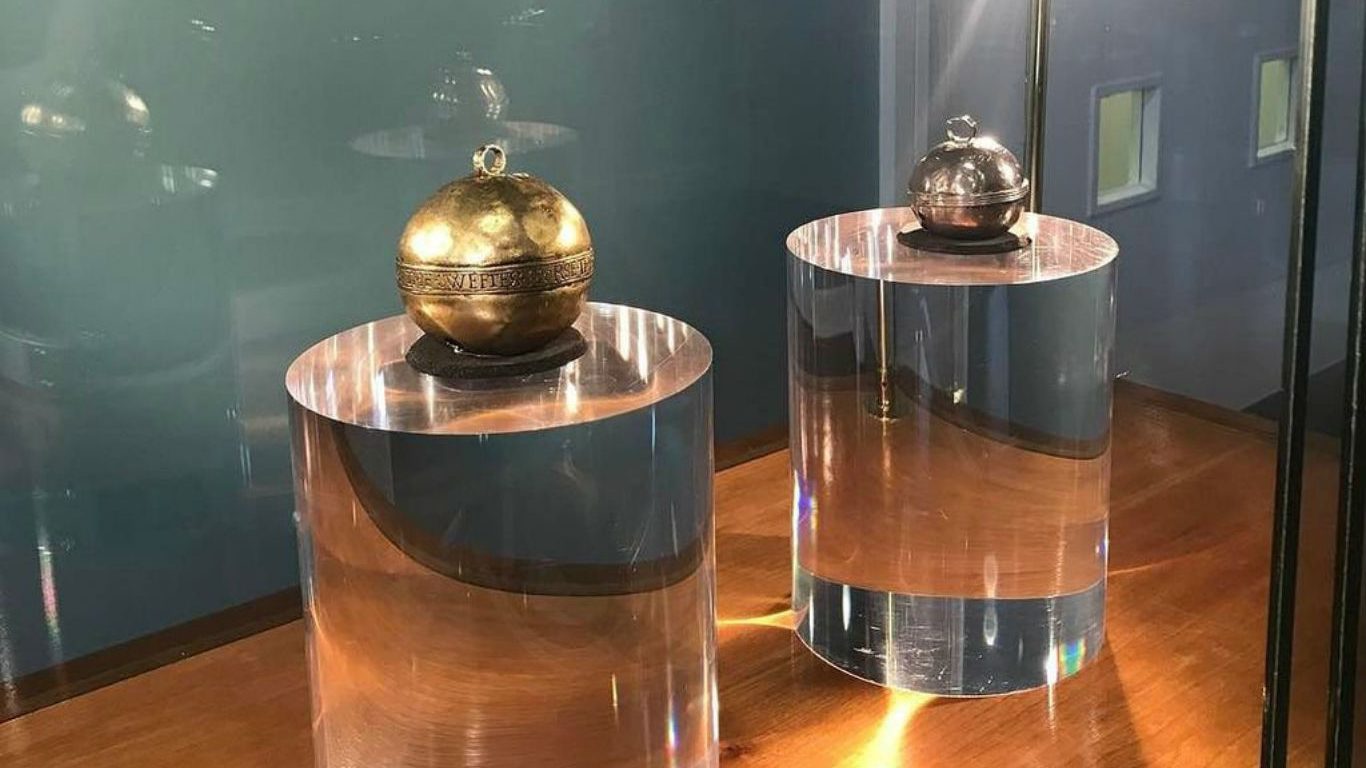
6. Trophy (still in use)
> Oldest: Carlisle Bells
> Approximate Date: 1599 A.D.
> Location: Carlisle, U.K.
Though they may not look that impressive, the Carlisle Bells have more history than any other trophy. First awarded in 1599, the Carlisle Bells to this day go to the winner of the Carlisle Bell horse race in Cumbria, England. The bells are too fragile to be handled by anyone but museum curators because of their old age. The bells were actually lost for years before being rediscovered during the 1800s.
[in-text-ad]
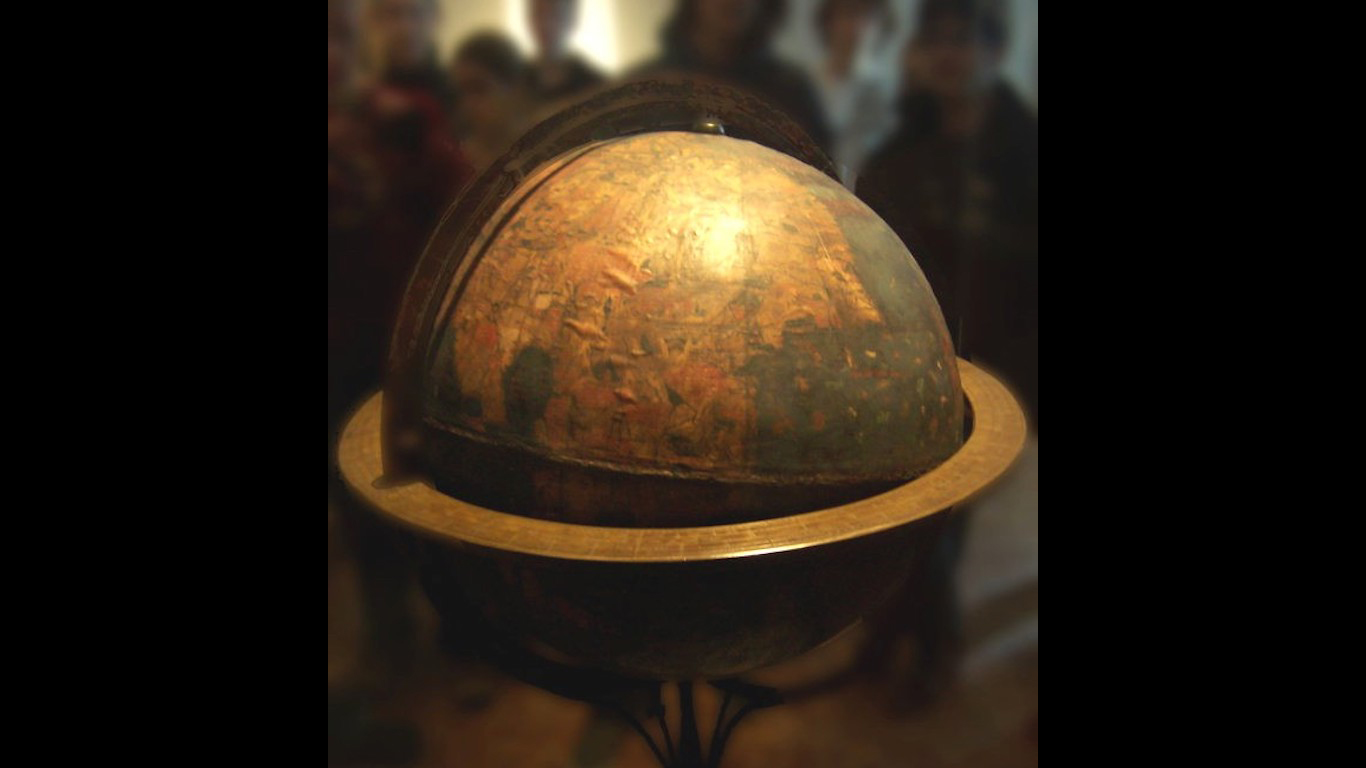
7. Globe
> Oldest: Behaim Globe
> Approximate Date: 1491 A.D.
> Location: Nuremberg, Germany
The Erdapfel, which roughly translates to “earth apple” from German, wasn’t the first globe created, but it’s believed that it is the oldest surviving 3-D model of earth. The Erdapfel is also known as the Behaim Globe, named for its creator Martin Behaim. Though it was impressive for its time, the Behaim Globe was proved to be inaccurate soon after its creation. Christopher Columbus brought word of the Americas back to Europe shortly after it was finished.

8. Glasses
> Oldest: Shogun Yoshimasa Ashikaga’s Eyeglasses
> Approximate Date: 1436-1490 A.D.
> Location: Japan
The world’s oldest pair of eyeglasses date back to the 15th century. They were owned by Shogun Yoshimasa Ashikaga of Japan. Both the eyeglasses and their case were made of hand-crafted white ivory. They can be found at the Daisen-in Temple in Kyoto, Japan. Eyeglasses were probably invented in Italy in the late 13th century.
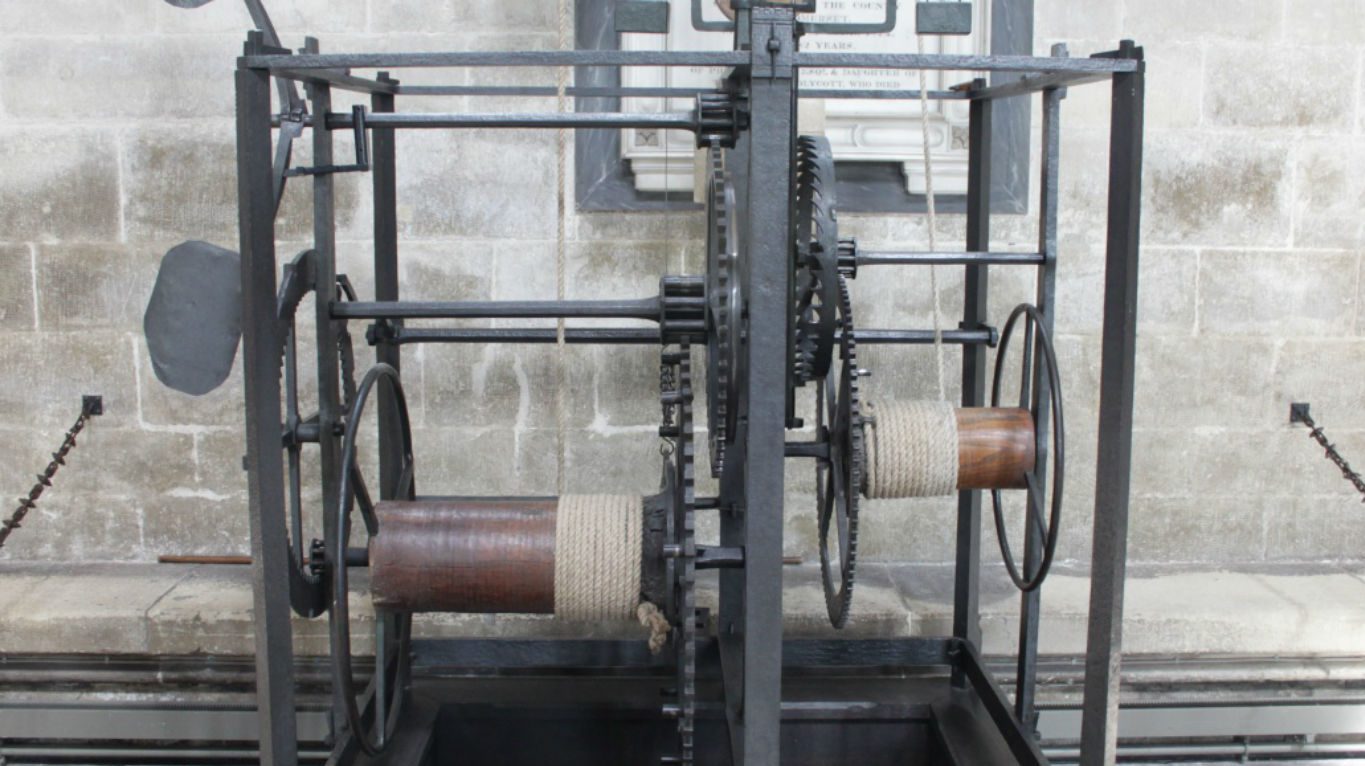
9. Clock
> Oldest: Salisbury Cathedral Clock
> Approximate Date: 1386 A.D.
> Location: Wiltshire, U.K.
Many years before cell phones and even pocket watches were the norm, people didn’t have much reason to know the exact time, except for when it was time to go to church. That’s likely why the world’s oldest working clock is housed in a church — Salisbury Cathedral in Wiltshire, England, to be specific. The clock, made in 1386 or possibly even earlier, fell into disrepair after it was replaced in 1884. The clock was restored in 1956 and still works to this day.
[in-text-ad-2]

10. Bar
> Oldest: Sean’s Bar
> Approximate Date: 900 A.D.
> Location: Athlone, Ireland
Sean’s Bar in Athlone, Ireland has been serving drinks for over a millennium. The watering hole, about two hours away from Dublin, has been confirmed as the oldest bar in Europe and quite likely the rest of the world by the Guinness Book of World Records. And if anyone knows about Irish bars, it is Guinness. The pub is still active and has live music frequently.
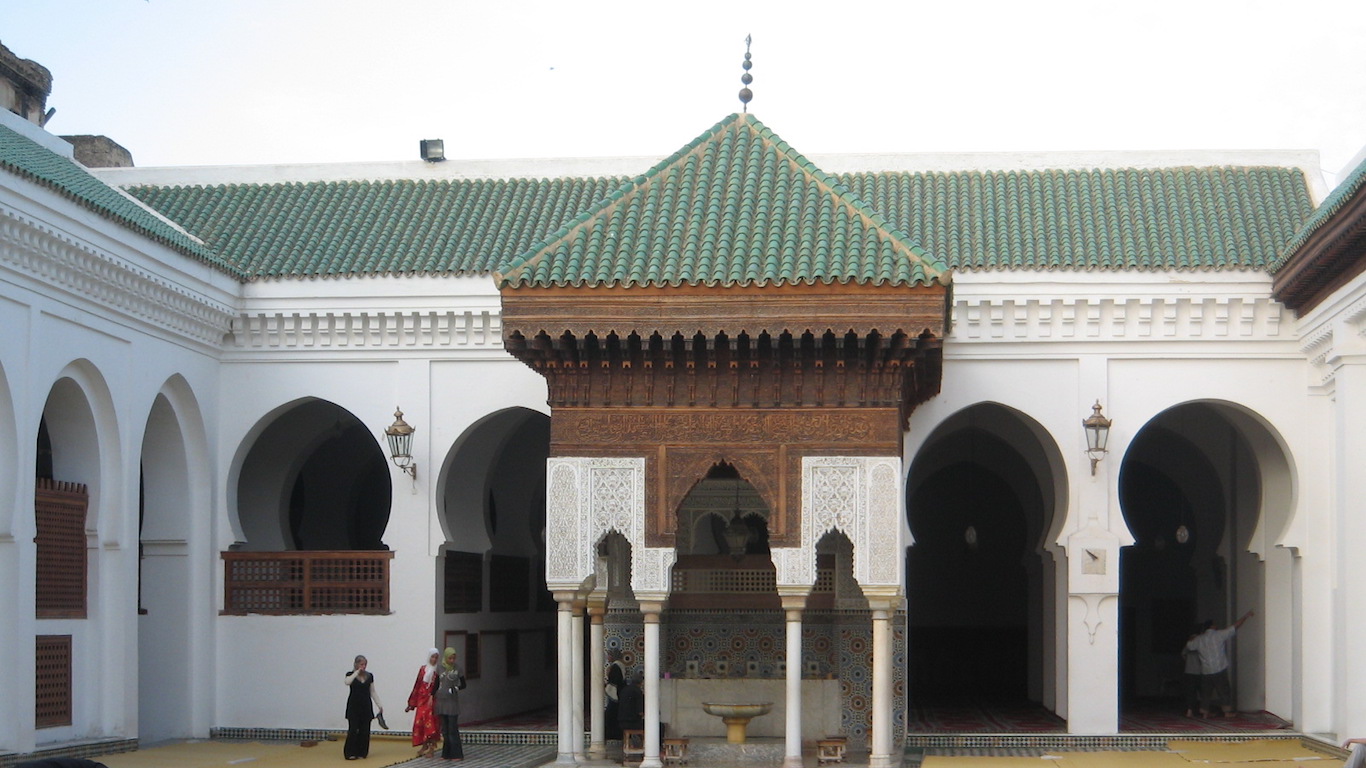
11. University
> Oldest: University of Al Quaraouiyine
> Approximate Date: 859 A.D.
> Location: Fez, Morocco
Originally founded as a mosque, the University of Al Qaraouyine opened in 859. The mosque was established by Fatima Al-Fihri, daughter of a wealthy merchant who used her inheritance to found the institution. It drew leading Muslim scholars to speak there. The building fell into disrepair, but Morocco’s culture ministry had it restored starting in 2012.
[in-text-ad]
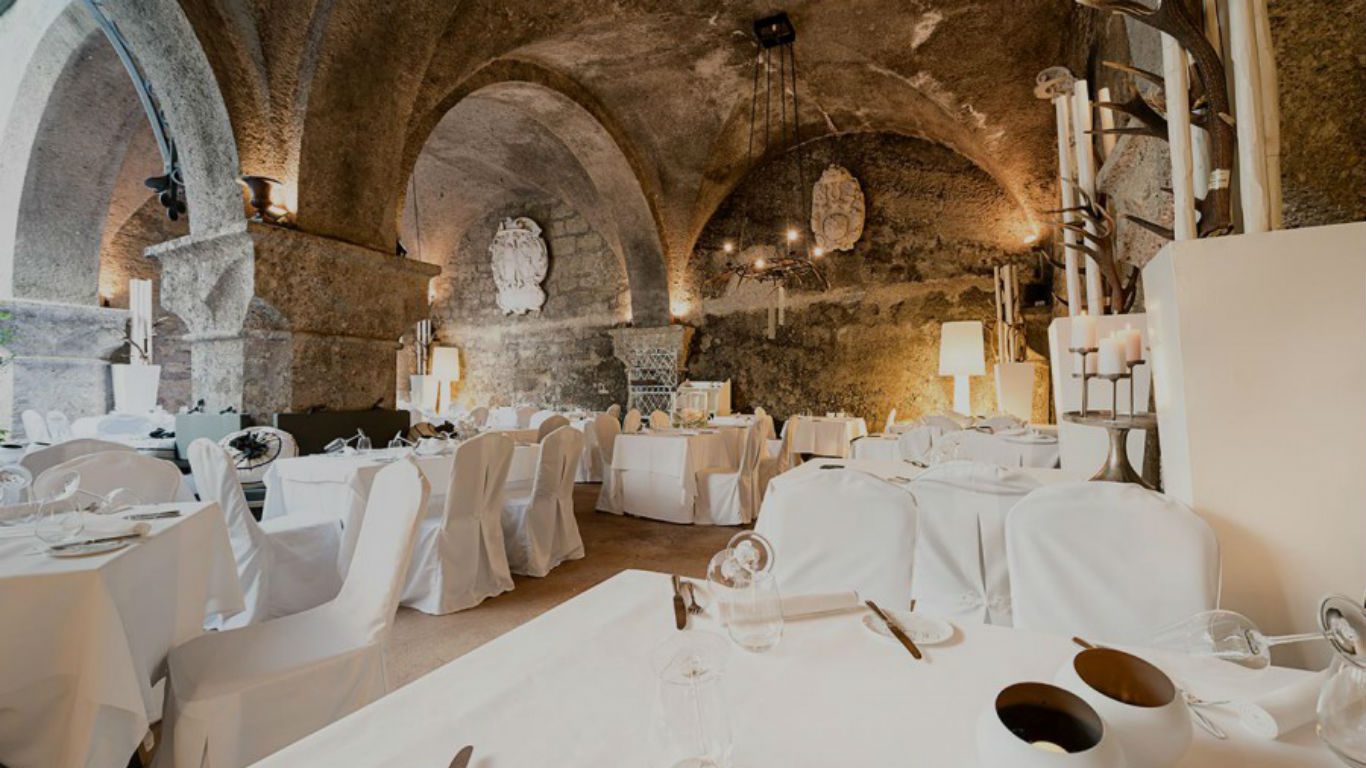
12. Restaurant
> Oldest: Stiftskeller St. Peter
> Approximate Date: 803 A.D.
> Location: Salzburg, Austria
After more than 1,000 years, Stiftskeller, the world’s oldest restaurant, is still operating in St. Peter’s Abbey, in the same building it was founded. Some of the restaurant is actually carved into the stone cliffs near the original abbey. The historic restaurant claims that it has hosted numerous celebrities and royals. Stiftskeller also happens to reside in the same town where Mozart was born, so it hosts Mozart nights. Patrons can listen to professional renditions of the master composer’s works while dining.

13. School
> Oldest: The King’s School
> Approximate Date: 597 A.D.
> Location: Canterbury
The King’s School in Canterbury, England — a town also famous for Chaucer’s “Canterbury Tales” — is believed to be the oldest school in the world. The school’s website says the institution was probably established by St. Augustine after he came to England in 597. Among the school’s alumni are playwright Christopher Marlowe and scientist William Harvey.

14. Company
> Oldest: Kongo Gumi
> Approximate Date: 578 A.D.
> Location: Japan
Kongo Gumi of Japan has been in the building business since 578 A.D. and is the oldest construction company in the world. It became a subsidiary of the Japanese construction business Takamatsu in 2006. Kongo Gumi is one of many very old Japanese companies. Japan is home to several of the oldest hotels in the world founded in the eighth century.
[in-text-ad-2]
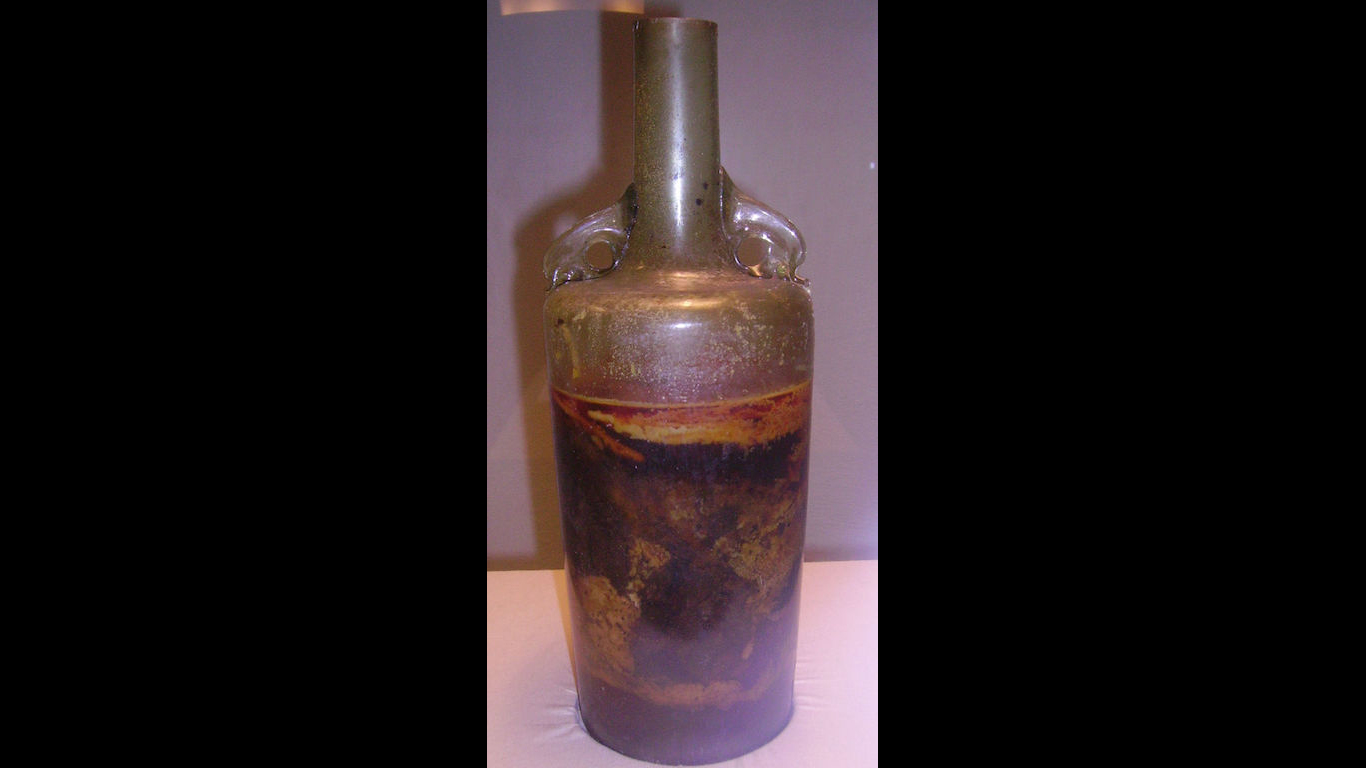
15. Wine Bottle
> Oldest: The Speyer Bottle
> Approximate Date: 325-350 A.D.
> Location: Speyer, Germany
People have enjoyed drinking wine for millennia, but it appears that no bottle has lasted as long as The Speyer Bottle in Germany. The bottle was buried in the tomb of a Roman noble around 325-350 A.D. and discovered, sealed with wax, in Speyer, Germany in 1867. Experts are unsure if the wine could stand the shock of being exposed to the air, though it may technically still be drinkable. Monika Christmann, a wine professor, said the contents of the bottle are “probably not spoiled, but it would not bring joy to the palate.”
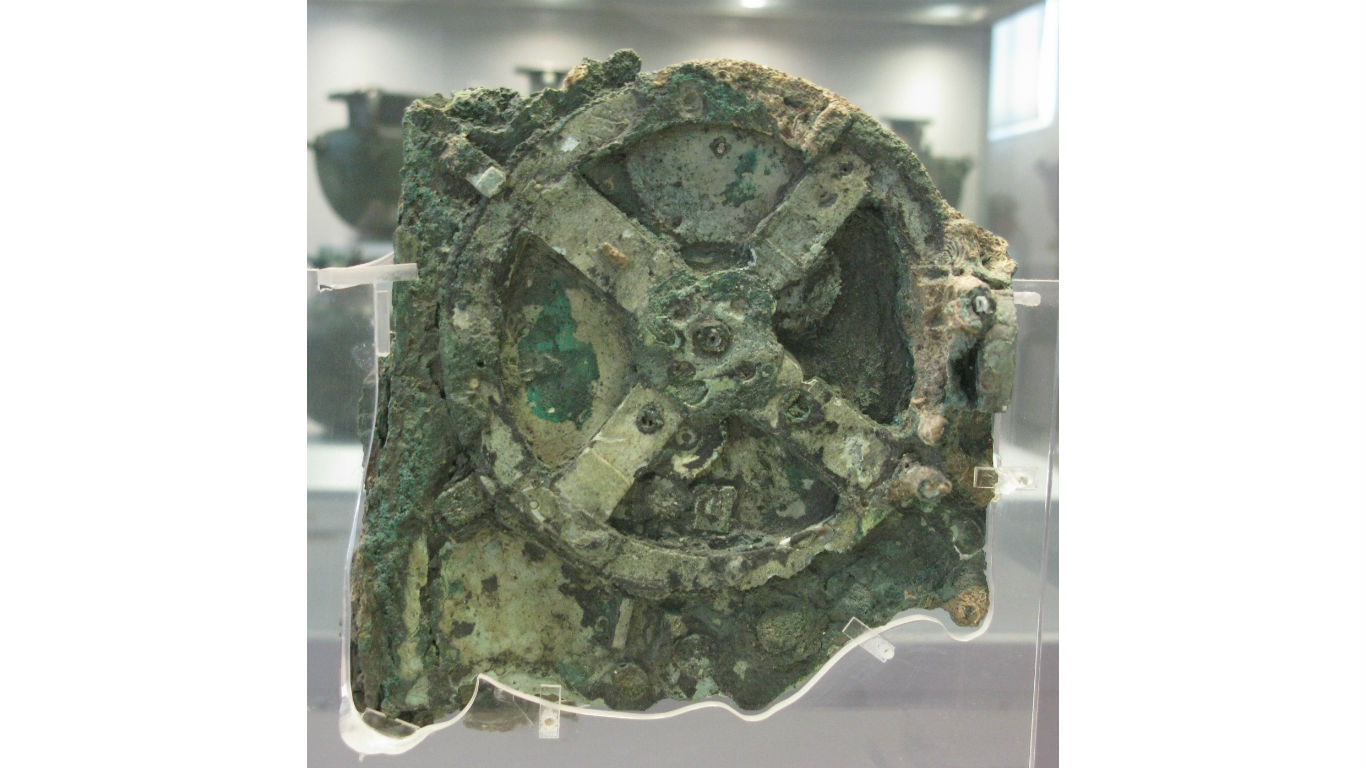
16. Computer
> Oldest: Antikythera Mechanism
> Approximate Date: 205 B.C.
> Location: Greece
Though it may not be considered a computer by today’s standards, the Antikythera mechanism was remarkably advanced for its time. Discovered in the wreckage of an ancient ship, the machine baffled scientists for decades before they realized it predicted the movements of the planets and the sun. The device could even tell when eclipses would occur. It was reportedly so advanced that it took over 1,000 years for anything else as advanced to be invented.
[in-text-ad]
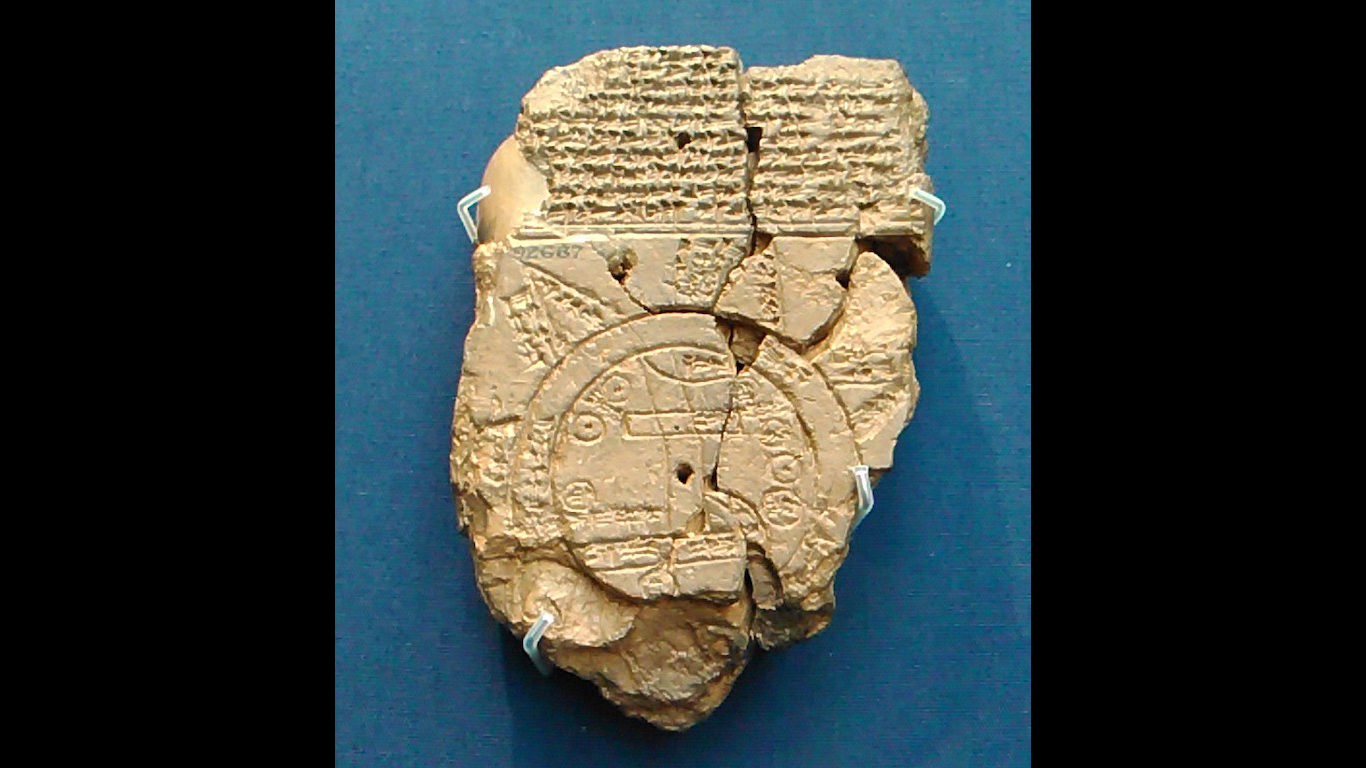
17. Map
> Oldest: Babylonian Map of the World
> Approximate Date: 700-500 B.C.
> Location: Babil Governorate, Iraq
The oldest known map depicts the Mesopotamian world and is inscribed on a tablet, which makes it difficult to fold and put in your pocket. Babylon is carved in the center of the map. Experts also identified places from antiquity such as Assyria. The lands on the map are circled by a body of water called the “Salt-Sea.” A cuneiform text accompanies the map and describes the region with accounts of heroes as well as mythical beasts. The map was discovered in the late 1800s in Sippar, Iraq, and is housed in the British Museum
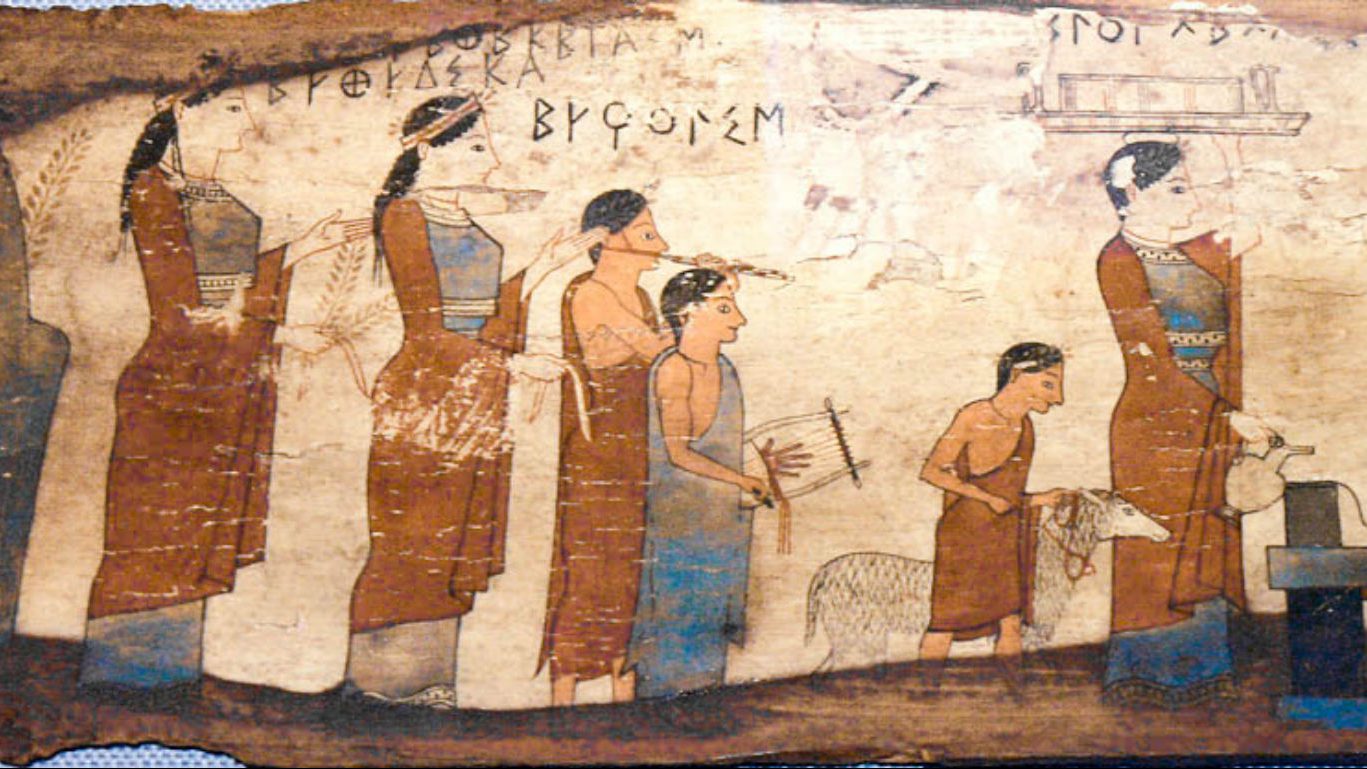
18. Movable Painting
> Oldest: Pitsa panels
> Approximate Date: 600 B.C.
> Location: Greece
The Pitsa painted panels in Greece are the oldest human paintings not found in caves. The oldest of these panels, found near the Corinthia region, date back to 600 B.C. Most of the examples of this kind of art that have survived are from Egypt and have been preserved by the dry climate.
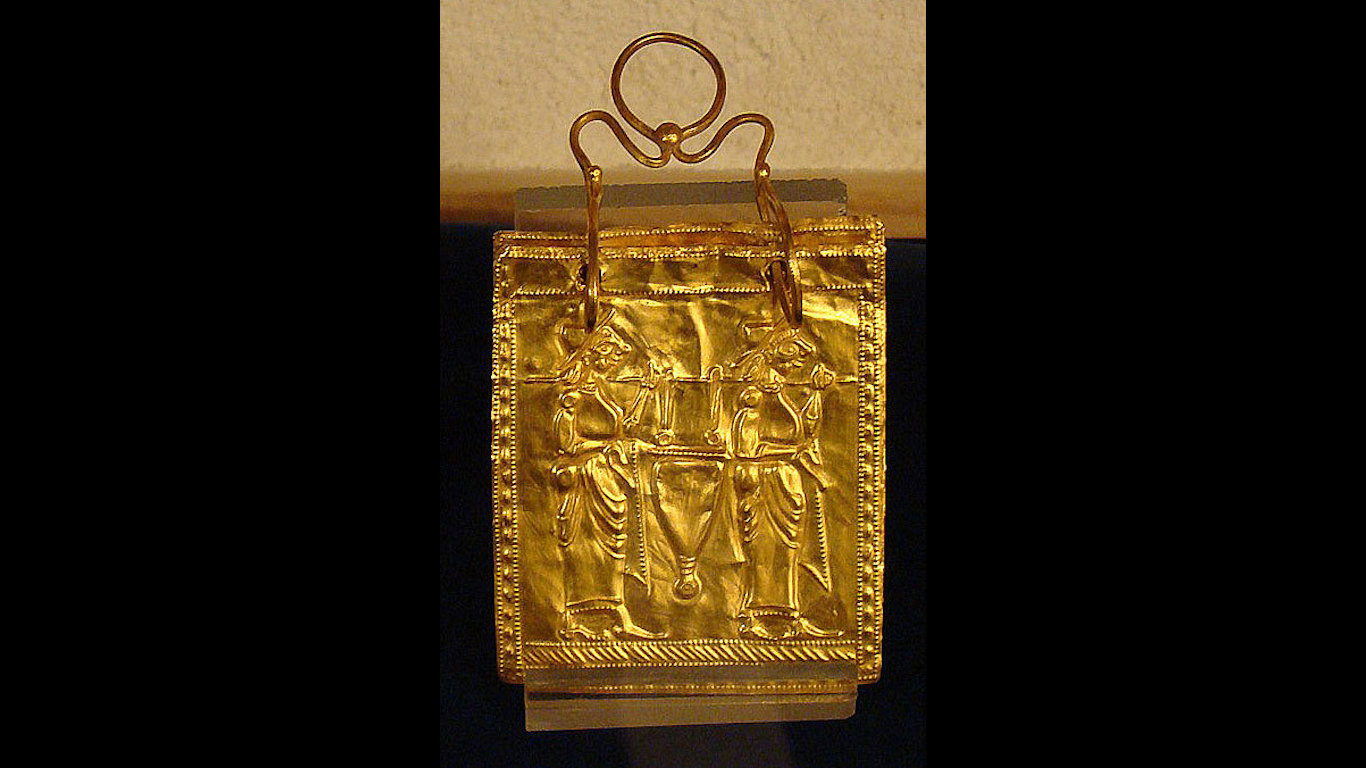
19. Tablet
> Oldest: The Etruscan Gold Book
> Approximate Date: 660-600 B.C.
> Location: Strouma River, Bulgaria
The Etruscan Gold Book, believed to be the oldest multi-page book in the world, is made from six sheets of 24-carat gold and bound with rings. The plates are inscribed in Etruscan characters and show a horse, horseman, a mermaid, and soldiers. The item was discovered in 1943 in a tomb while workers were digging a canal near the Struma River in Bulgaria. The book can be found in Bulgaria’s National History Museum in the city of Sofia.
[in-text-ad-2]
20. Currency
> Oldest: Lydian Stater
> Approximate Date: 750-560 B.C.
> Location:
It’s believed the ancient kingdom of Lydia (now known as Turkey) was the first to use coins as currency well over 2,500 years ago. The coins, known as staters, were made of a naturally occurring gold and silver alloy known as electrum, helping them stand the test of time. Lydia’s far reach helped spread the staters across Eurasia. In 2014, a diver in Bulgaria found one in the Black Sea.
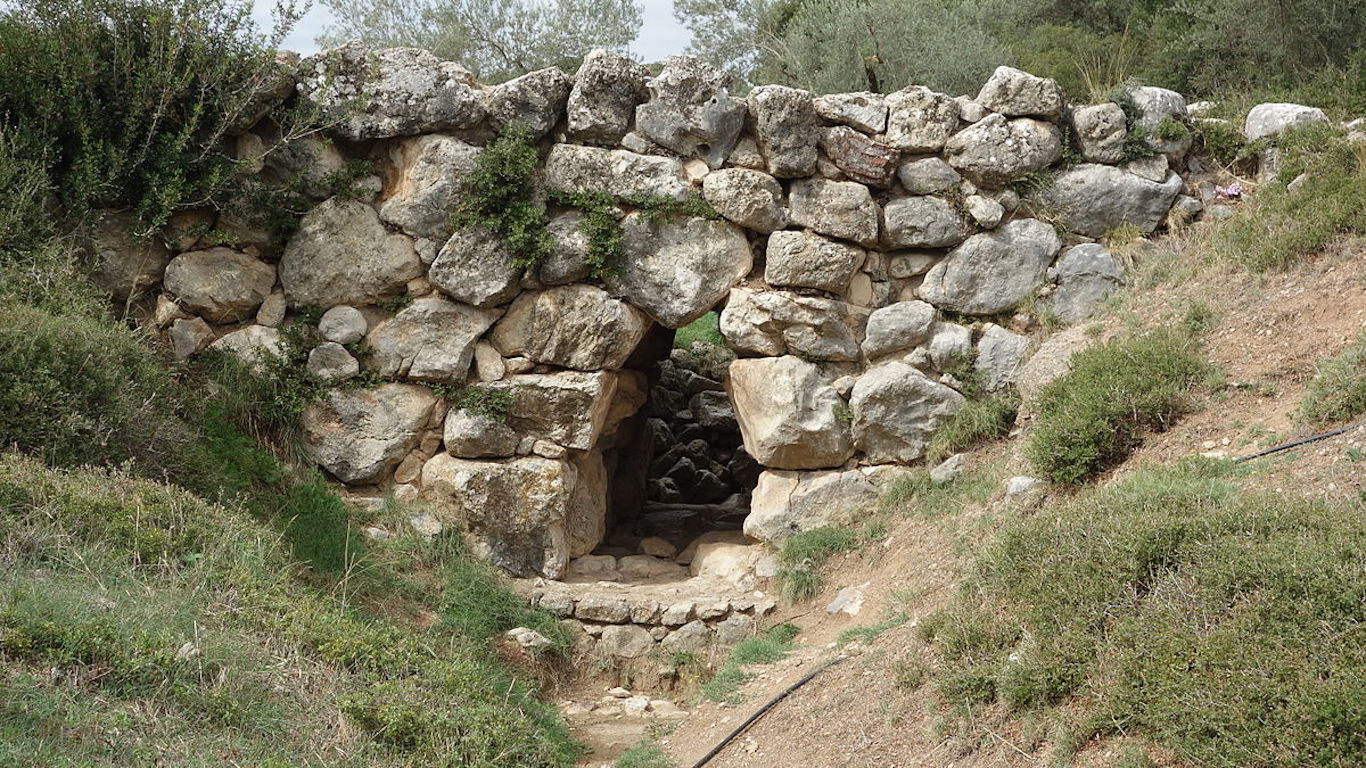
21. Bridge
> Oldest: Mycenaean Bridge at Kazarma
> Approximate Date: 1,300-1,200 B.C.
> Location: Arkadiko, Greece
Even if something is ancient it can still be useful. The Mycenaean Bridge at Kazarma was built more than 3,000 years ago but is still used by modern Greeks. The arch bridge is an impressive feat of engineering, as it doesn’t use any type of adhesive to hold itself together. It was also built with curbs, presumably to keep speeding chariots from falling off.
[in-text-ad]
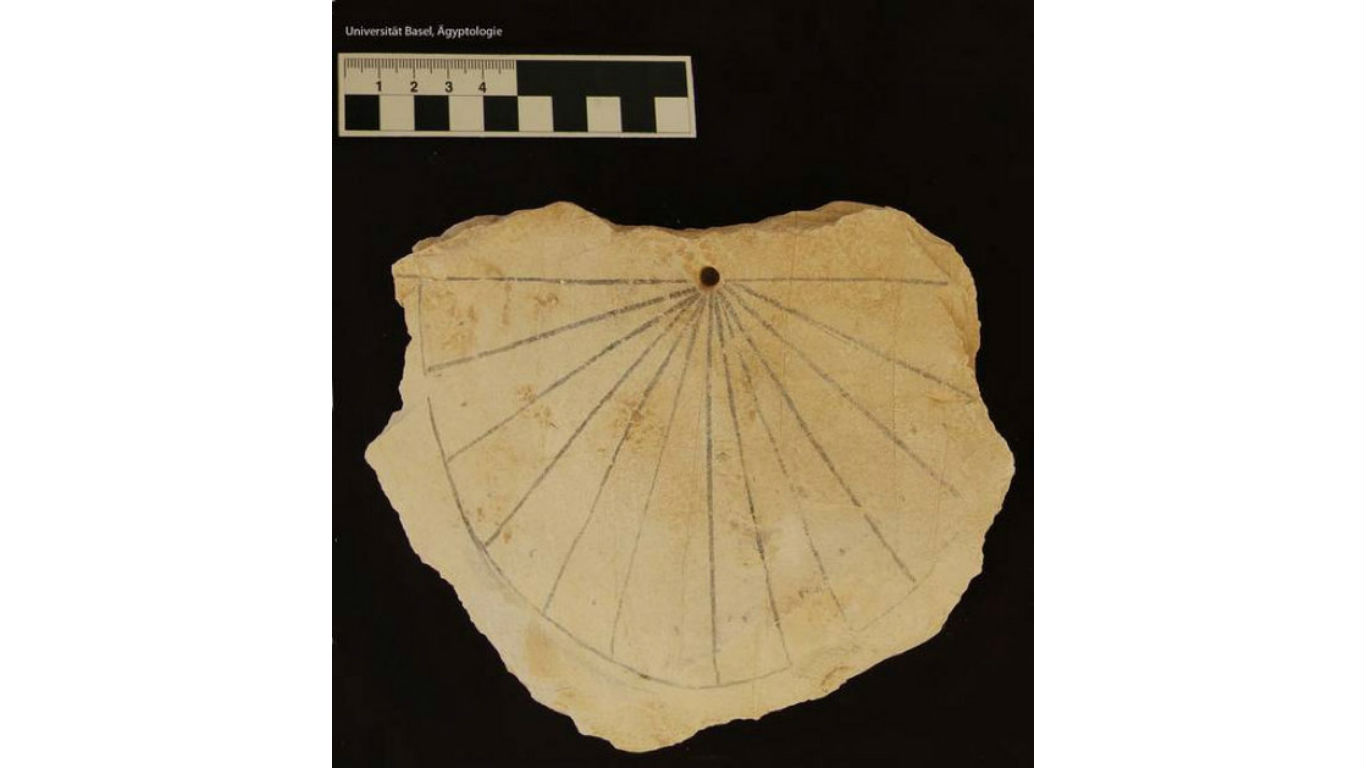
22. Timepiece
> Oldest: Ancient Egyptian Sundial
> Approximate Date: 1,300 B.C.
> Location: Egypt
The world’s oldest timepiece is an Egyptian sundial that dates back to the 13th century B.C. The device was discovered in 2013 in a hut in the Valley of the Kings, where Egypt’s rulers are buried. The age of the instrument is about 1,000 years older than what researchers had thought was the oldest sundial.
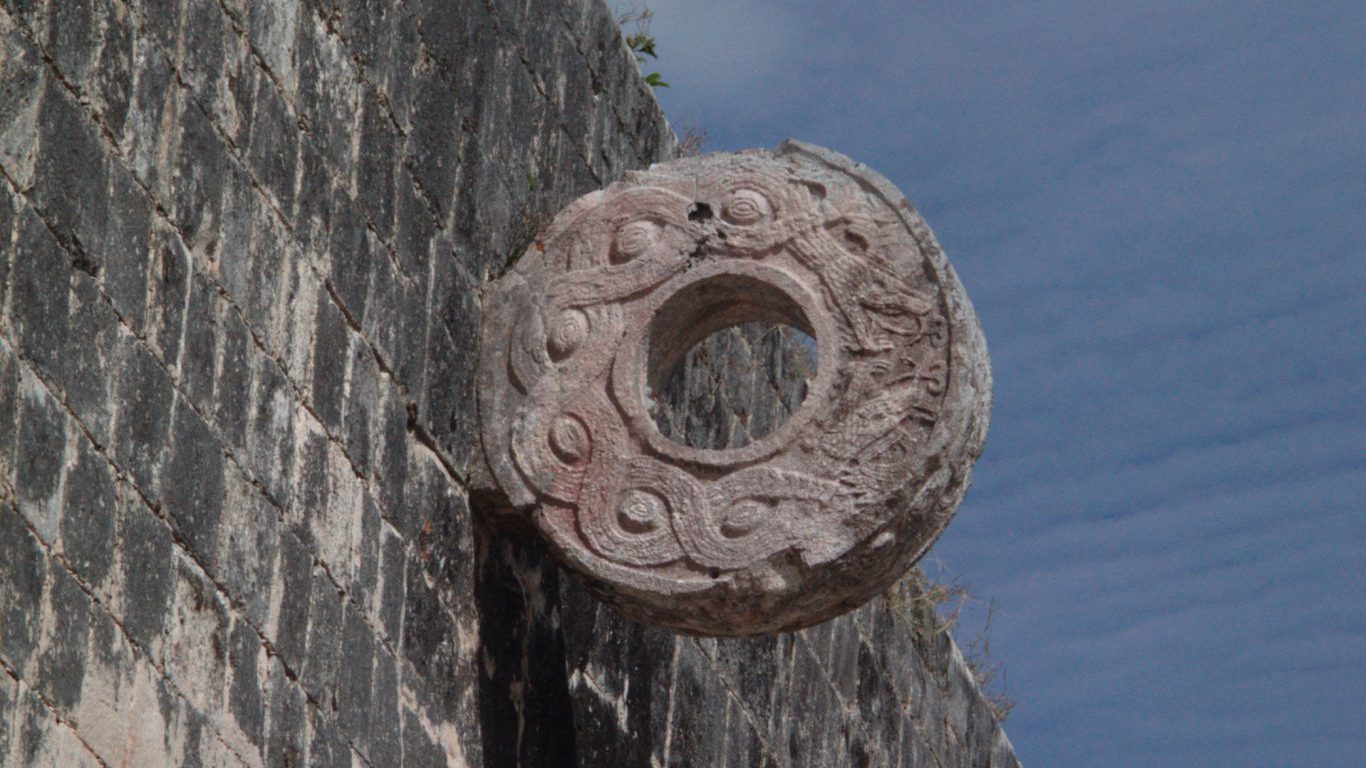
23. Original Sport
> Oldest: Mesoamerican Ball Game
> Approximate Date: 1,600 B.C.
> Location: Modern-day South America
The Mesoamerican Ball Game, called ulama, was played under various sets of rules using a rubber ball in contests that pitted two teams against each other. More than 1,500 ulama ball courts have been unearthed where Mayan and Aztec civilizations flourished. Spectators ate venison and imbibed an alcoholic drink from fermented corn while watching the game. The phrase “sudden death” takes on a different meaning for this contest; the losers could be decapitated.
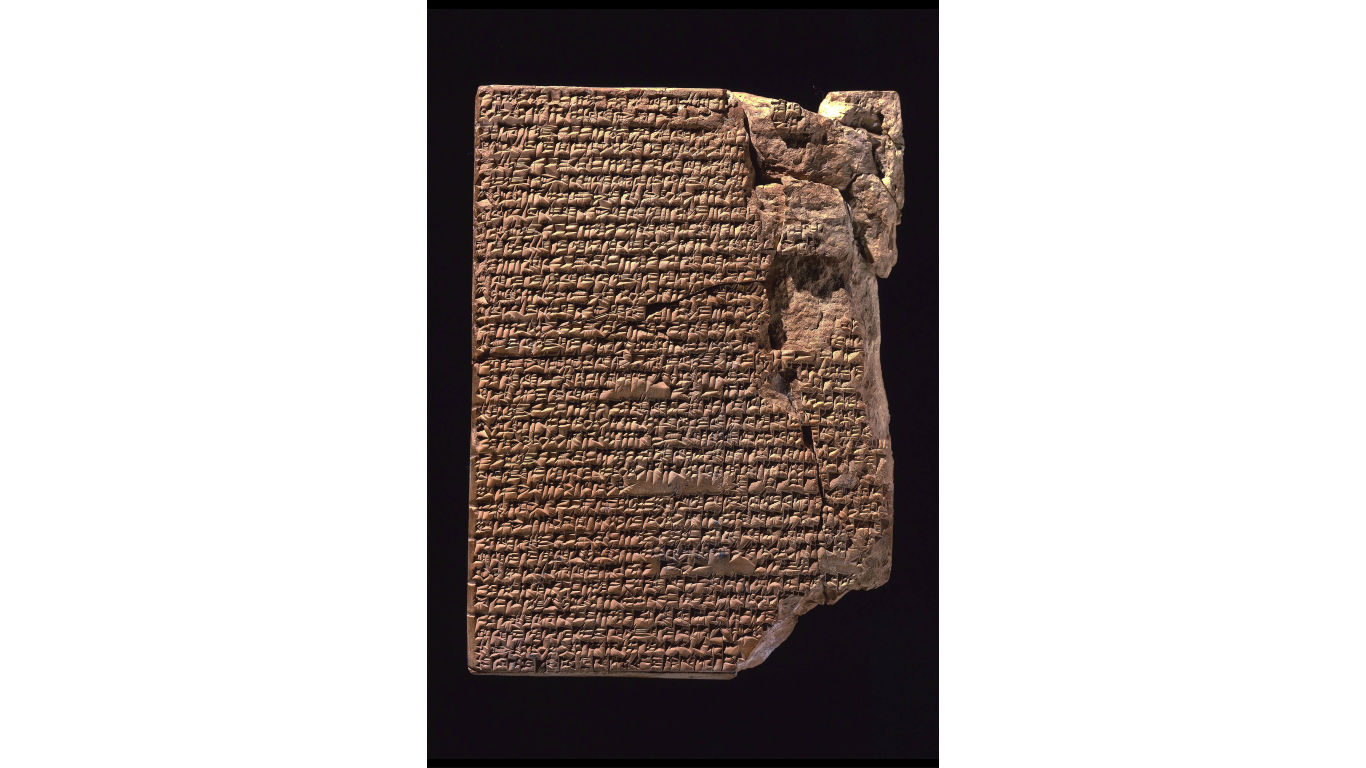
24. Cookbook
> Oldest: Clay tablet Akkadian cookbook
> Approximate Date: 1,700 B.C.
> Location: Babylon
The oldest cookbook dates from 1,700 B.C. It is written on three clay tablets in cuneiform — an early writing system invented by the Sumerians. The artifact is housed at Yale University. Scientists believe the 35 recipes in the cookbook were written for professional cooks. So what did foodies eat in the time of King Hammurabi? Stews and broths featuring meat such as fowl and mutton.
[in-text-ad-2]
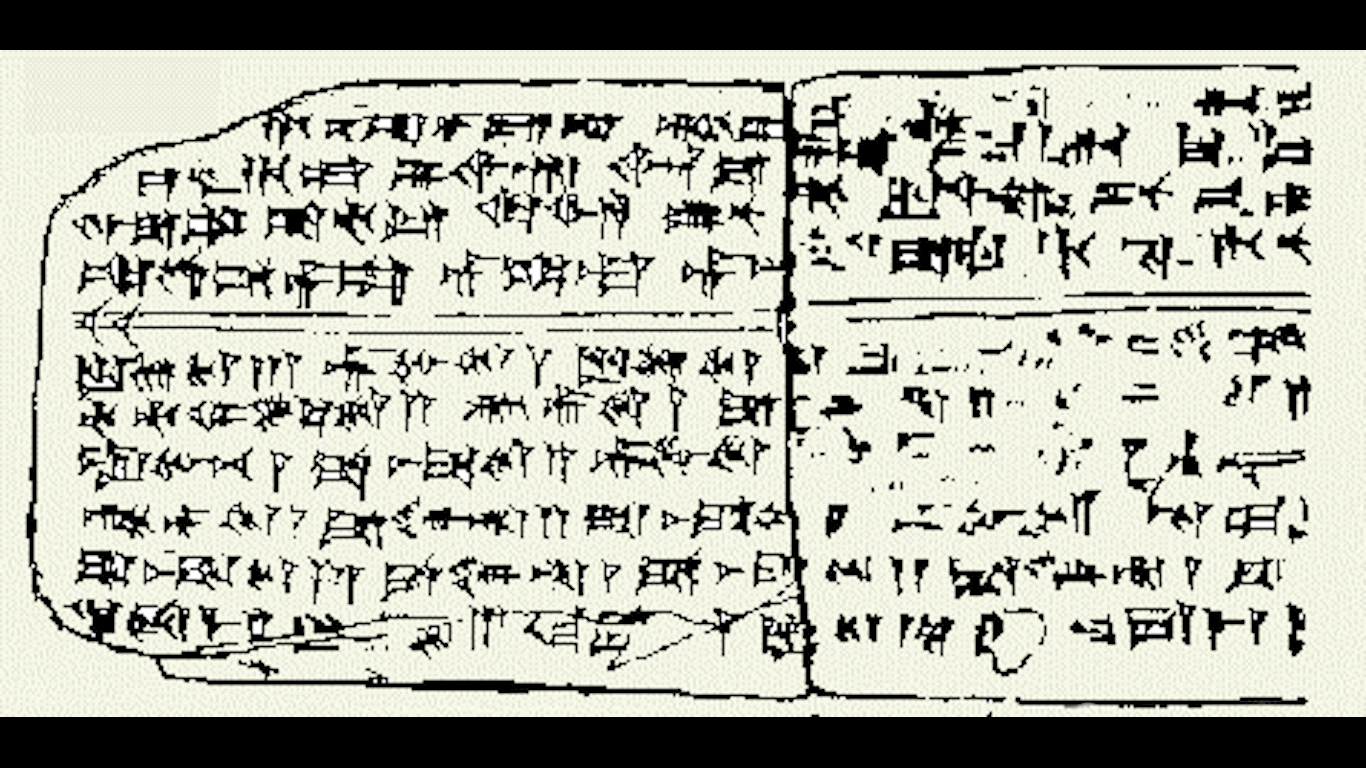
25. Written Piece of Music
> Oldest: Hurrian Hymn No. 6
> Approximate Date: 2,000-1,400 B.C.
> Location: Ugarit, Syria
The oldest known written piece of music is titled “Hurrian Hymn No. 6,” an ode to the goddess Nikkal, that was created in 1,400 B.C. and found in the ancient Syrian city of Ugarit. The song was inscribed on clay tablets in cuneiform. Accompanying the song were instructions on how to play it on a lyre. Before the discovery of the hymn in the 1950s, music historians had believed the music scale was only about as old as the ancient Greeks.
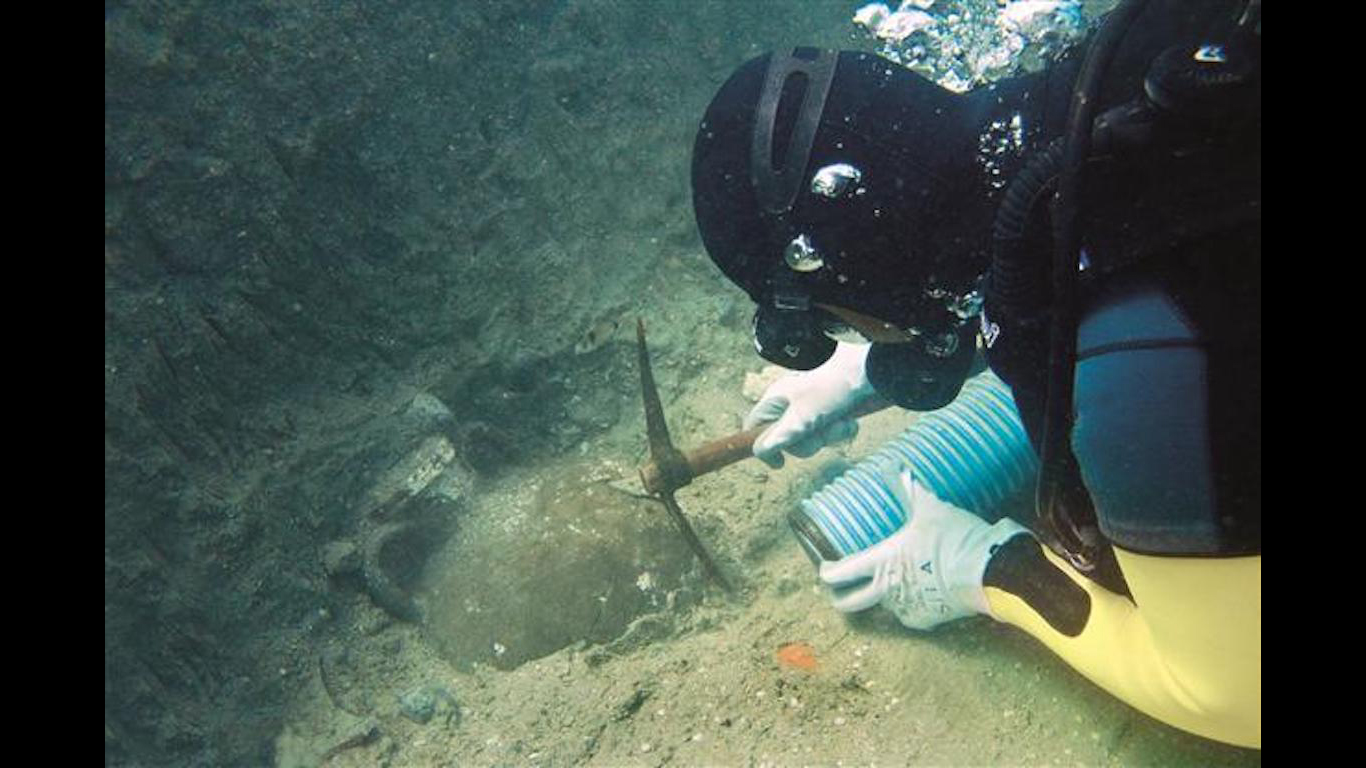
26. Shipwreck
> Oldest: Port of Urla Wreck
> Approximate Date: 2,000 B.C.
> Location: Izmir, Turkey
Experts believe the world’s oldest shipwreck was found at Turkey’s Urla Port. The ship is estimated to be about 4,000 years old. The discovery was made by archaeologists from Ankara University in 2014. The port dates to the seventh century B.C., and because it was a coastal town, it is the site for many other sunken ships. An earthquake in the eighth century devastated the city, and it sank into the sea.
[in-text-ad]

27. Written Language
> Oldest: Chinese
> Approximate Date: 1,250 B.C.
> Location: China
The oldest living language in the world is Chinese, whose earliest written evidence dates back to about 1,250 B.C. Scholars think the Chinese language is older than that, however, as some precursors of the language date back thousands of years earlier. There are about 1.2 billion Chinese speakers in the world today. Other old languages still spoken are Tamil, Hebrew, and Sanskrit.
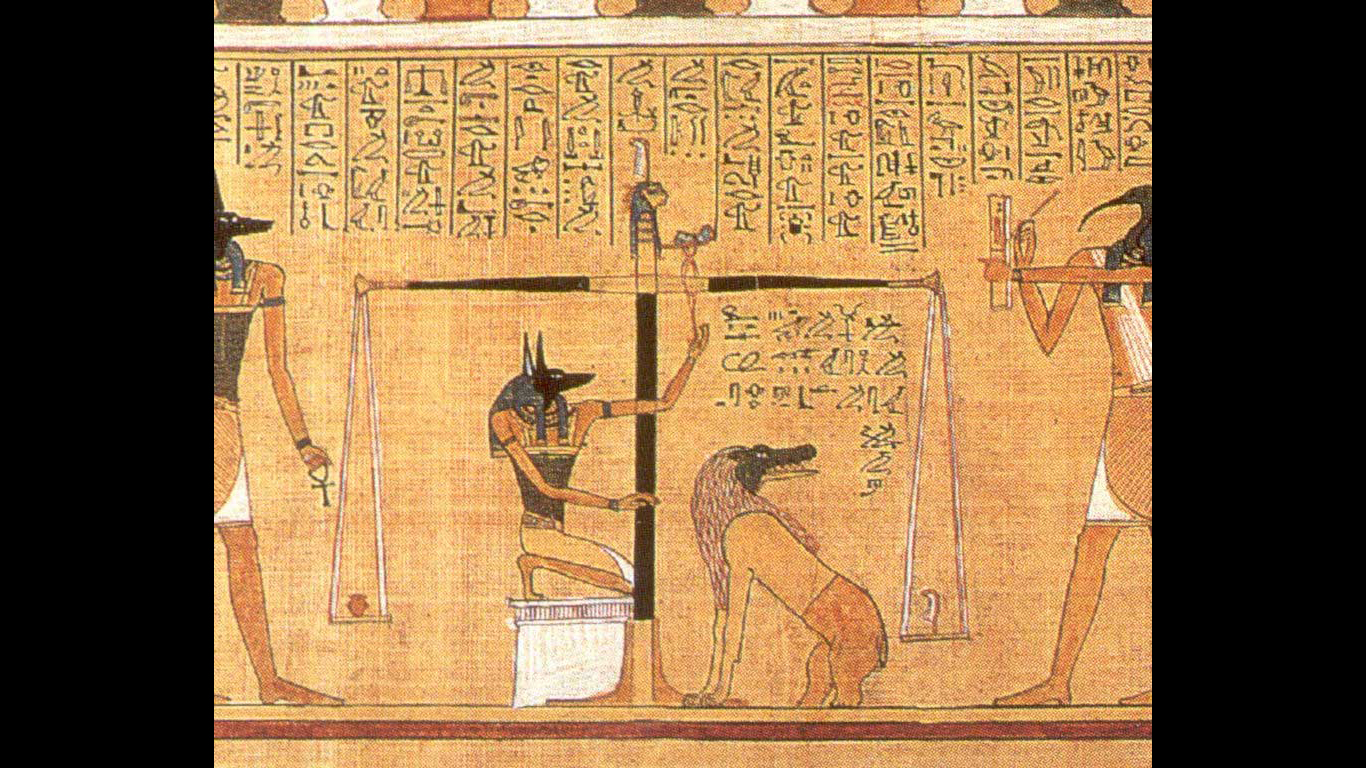
28. Religious Text
> Oldest: Egyptian Book of the Dead
> Approximate Date: 2,670 – 2,613 B.C.
> Location: Egypt
The Egyptian Book of the Dead was a set of instructions for deceased Egyptians to navigate through the tests they would encounter in the various stages of the afterlife. The paintings and texts were first found in tombs associated with Egypt’s Third Dynasty and date back more than 4,600 years. The book eventually became extremely popular, and individuals who fell ill would often commission their own copy. One completed copy was measured at more than 40 feet long.
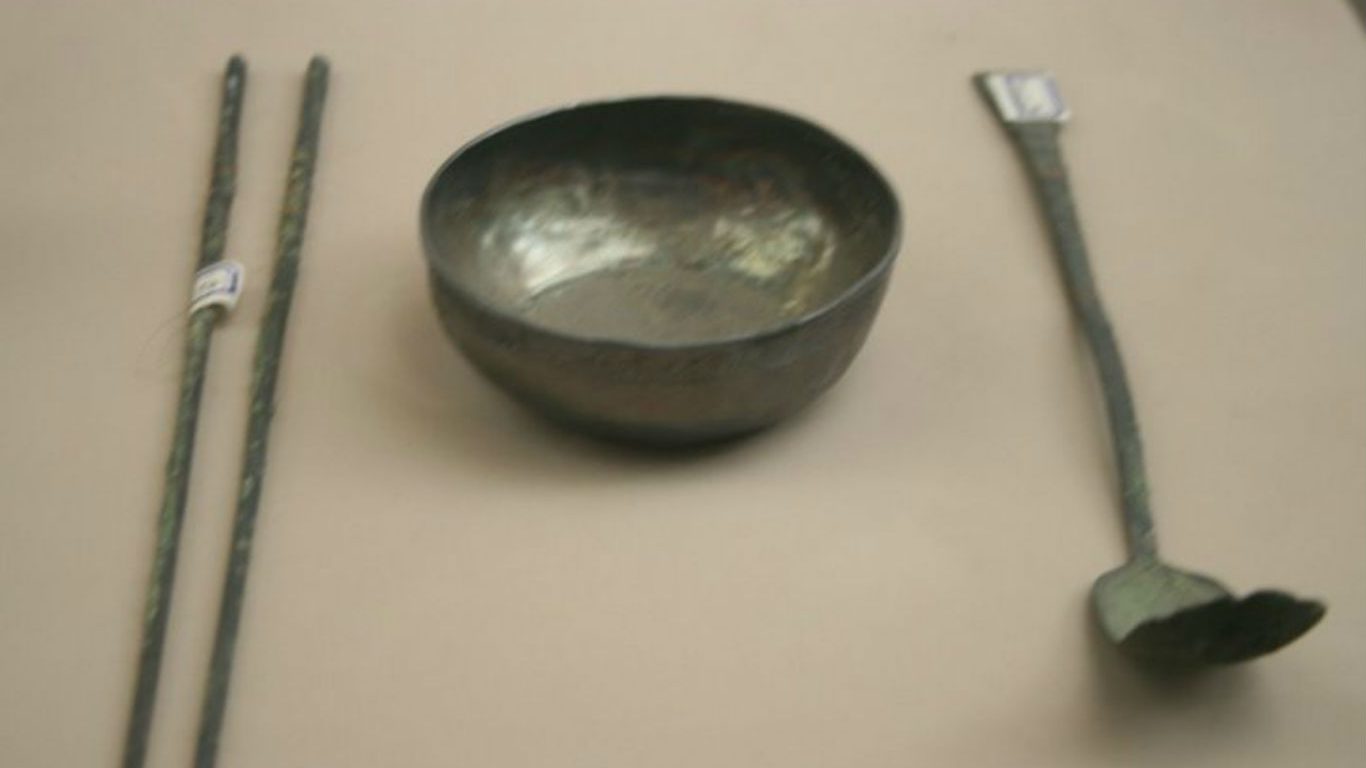
29. Eating Utensil
> Oldest: Chopsticks
> Approximate Date: 3,000 B.C.
> Location: China
The first chopsticks were probably used mainly for cooking. They did not become a utensil until later when China’s population rapidly increased, putting pressure on cooks to reduce costs. They cut food into smaller pieces that required less cooking oil and the smaller morsels were the perfect size for chopsticks. Some superstitions have been associated with chopsticks, such as the belief that if one is given an uneven pair of them, you will miss a boat or plane.
[in-text-ad-2]
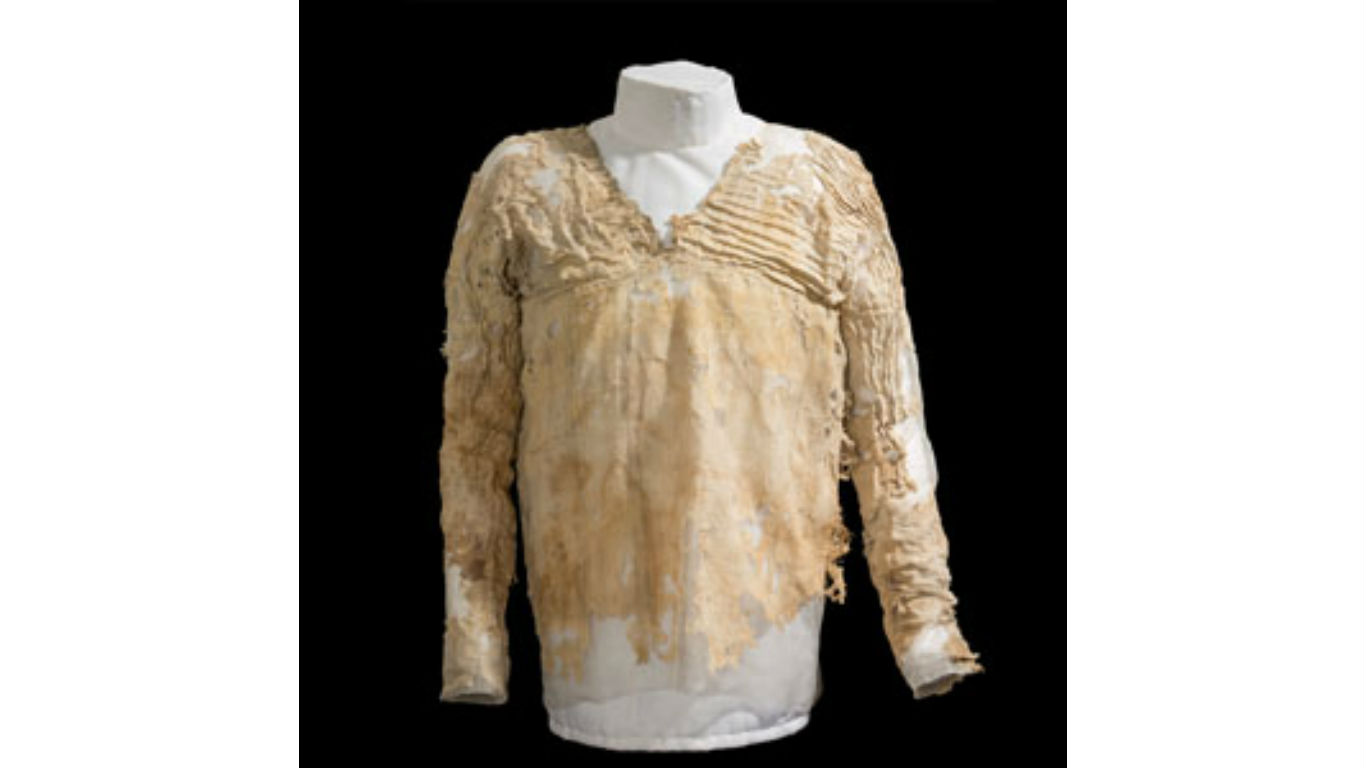
30. Garment
> Oldest: Tarkhan Dress
> Approximate Date: 3,000 B.C.
> Location: Egypt
The earliest example of fashion is known as the Tarkhan Dress. It was made in Egypt 5,000 years ago and is the oldest dress in the world. The garment, housed in the Petrie Museum of Egyptian Archaeology in London, features tailored sleeves, a V-neck, and is pleated. The garment was excavated in the early part of the 20th century but was overlooked for decades until it was found among a bunch of rags in 1977.
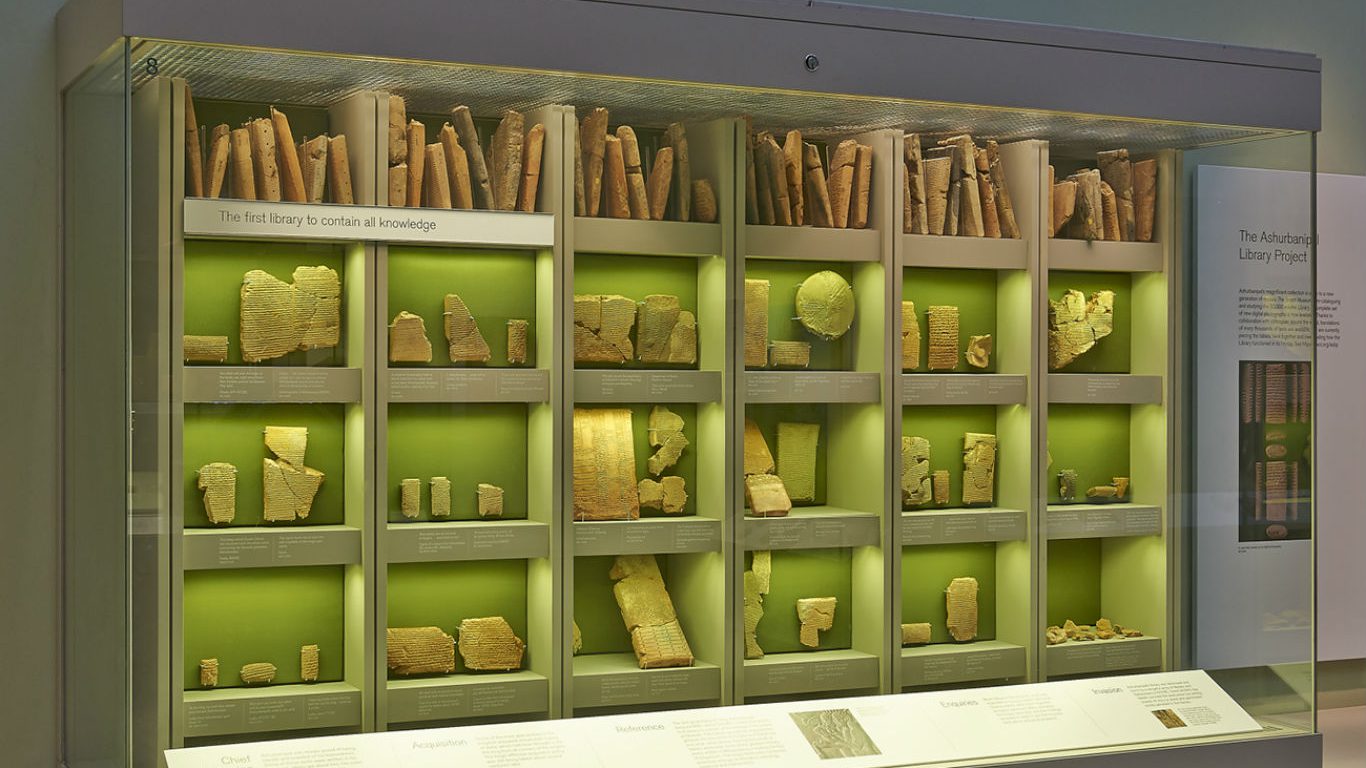
31. Writing
> Oldest: Clothing receipt
> Approximate Date: 3,000 B.C.
> Location: present-day Bahrain
The oldest example of writing is a receipt for clothes from about 3,000 B.C. It was inscribed on a clay tablet in cuneiform and was discovered in what is present-day Bahrain — an indication that record-keeping was already becoming important to ancient peoples. It is not known if the customer sought a refund for the item.
[in-text-ad]
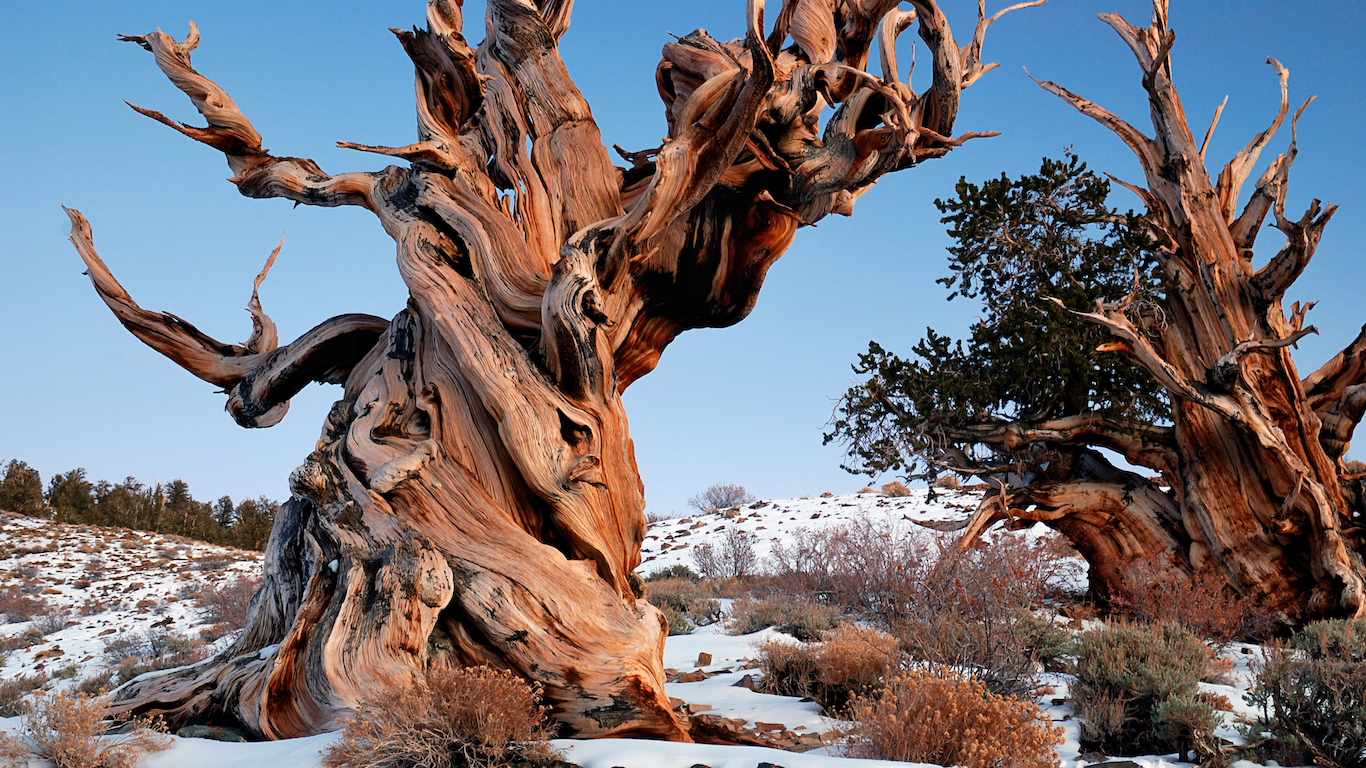
32. Tree
> Oldest: White Mountains Bristlecone Pine
> Approximate Date: 3,050 B.C.
> Location: White Mountains, California
Scientists recently discovered that the oldest single tree in the world is 5,067 years old as of the 2017 growing season. The tree is a Bristlecone Pine, found in White Mountains, California. It beats the previous record holder named Methuselah, which is located nearby. While the general location is known, the precise spot is a secret to keep the tree safe.

33. Food
> Oldest: Neolithic Burnt Bread
> Approximate Date: 3,620-3,350 B.C.
> Location: Oxfordshire, England
The oldest food is not found in a college fraternity refrigerator but is believed to be a piece of burnt bread found in Oxfordshire, England. Originally, the 5,500-year old overcooked bread was thought to be charcoal. Then an archeologist found crushed grains of barley, indicating that those inhabiting what would become England were practicing farming during the Neolithic era.
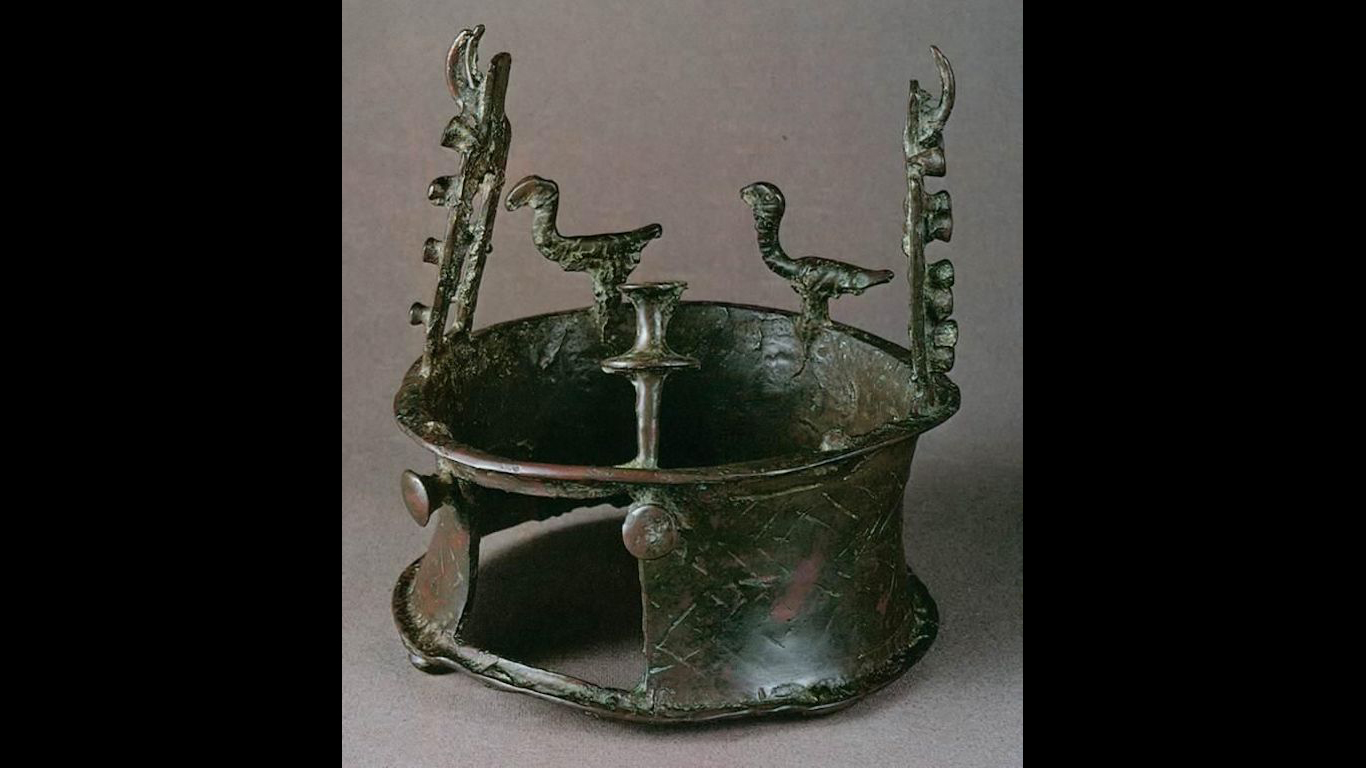
34. Crown
> Oldest: Nahal Mishar Hoard Crown
> Approximate Date: 4,500-3,600 B.C.
> Location: Judaean Desert, Israel
The world’s oldest crown was discovered in a cave above the Dead Sea in 1961. Before that, it sat in the cave for roughly 6,000 years. It’s not a fancy crown compared with diamond and jewel encrusted crowns we think of today. It’s simple, made of metal and adorned with vultures and doors. It comes from the Nahal Mishmar Hoard, a group of hundreds of artifacts that became one of the most important finds from the Copper Age.
[in-text-ad-2]
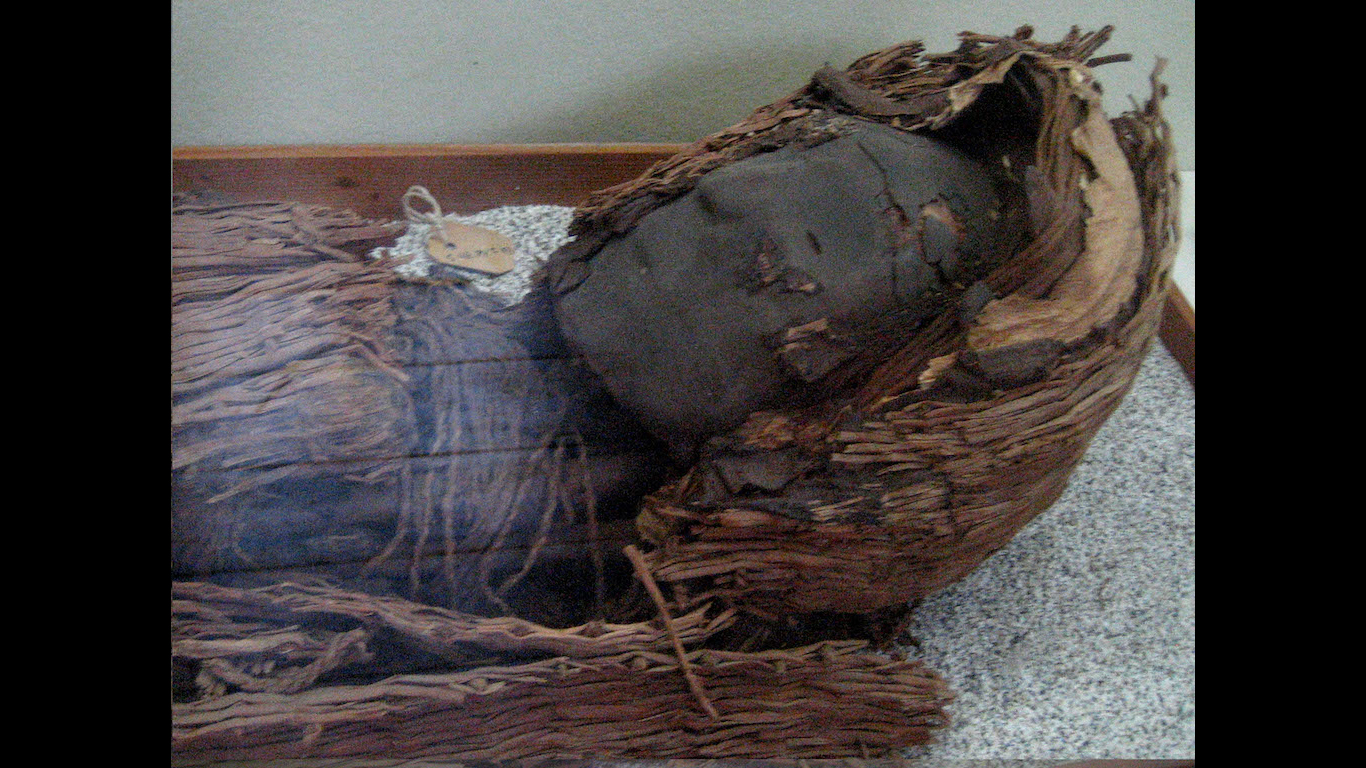
35. Mummy
> Oldest: The Chinchorro Mummies
> Approximate Date: 5,050 B.C.
> Location: Atacama Desert, northern Chile
Though Mummies are often associated with Egypt, the earliest instances of mummification were actually found in South America. The Chinchorro people of the Atacama Desert, which is now in Chile, mummified their dead — and not just the wealthy and powerful. Archaeologists say all dead Chinchorros were mummified, regardless of status. Though the remains were preserved, the mummies are now deteriorating due to bacteria.

36. Recipe
> Oldest: Nettle pudding
> Approximate Date: 6,000 B.C.
> Location: United Kingdom
Nettles are typically thought of as something to avoid, but early humans may have counted them among their favorite foods. Welsh researchers discovered that people would mix boiled nettles with barley and water to make a sort of nettle pudding. Apparently, nettles won’t sting you if they are cooked.
[in-text-ad]
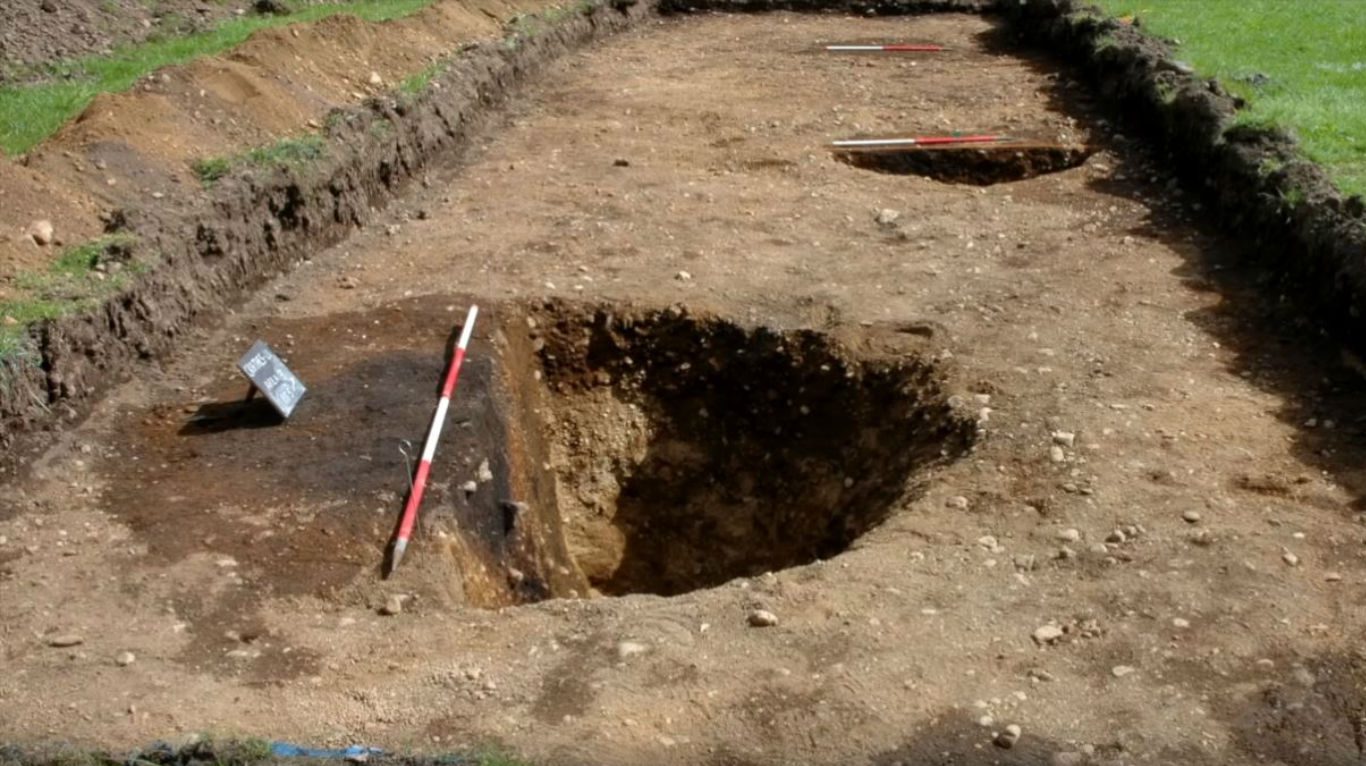
37. Calendar
> Oldest: Warren Field Calendar
> Approximate Date: 8,000 B.C.
> Location: Scotland
Archaeologists think they discovered the world’s oldest calendar in Scotland in 2013. The calendar is believed to date back 10,000 years. Researchers from the University of Birmingham came upon a series of 12 pits near a castle in Aberdeenshire that followed the phases of the moon. Scientists think the hunter-gatherer society at the time needed accurate ways to track the passage of time. The discovery predates by 5,000 years the previously oldest calendar that was found in Mesopotamia.
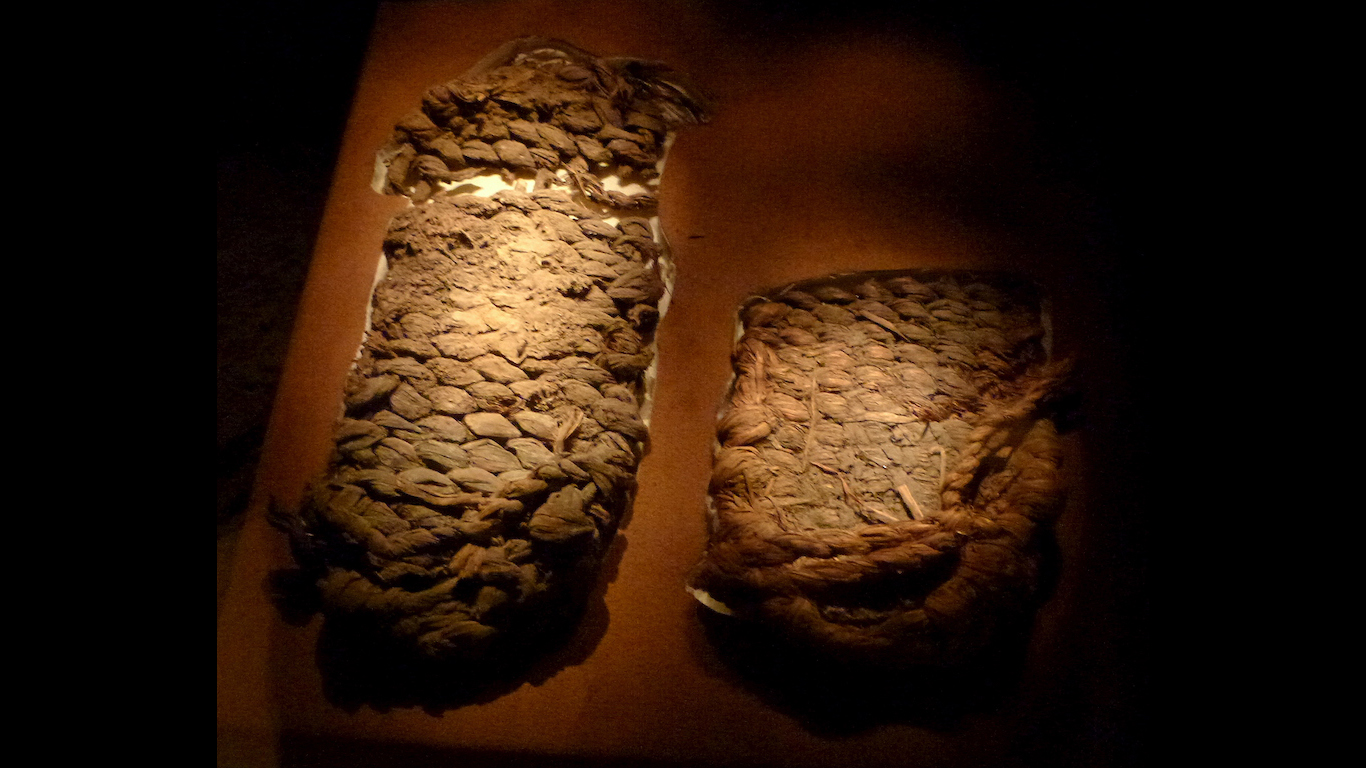
38. Shoes
> Oldest: Fort Rock Shoes
> Approximate Date: 8,970-7,700 B.C.
> Location: Fort Rock, Oregon
The oldest shoes in the world were actually found in the new world, in Fort Rock Cave in Oregon in 1938. Anthropologist Luther Cressman discovered dozens of sandals under a layer of volcanic ash that scientists say came from the eruption of Mount Mazama 7,500 years ago. Fibers from the sandals were determined to be more than 9,000 years old. They were made of shredded sagebrush bark.
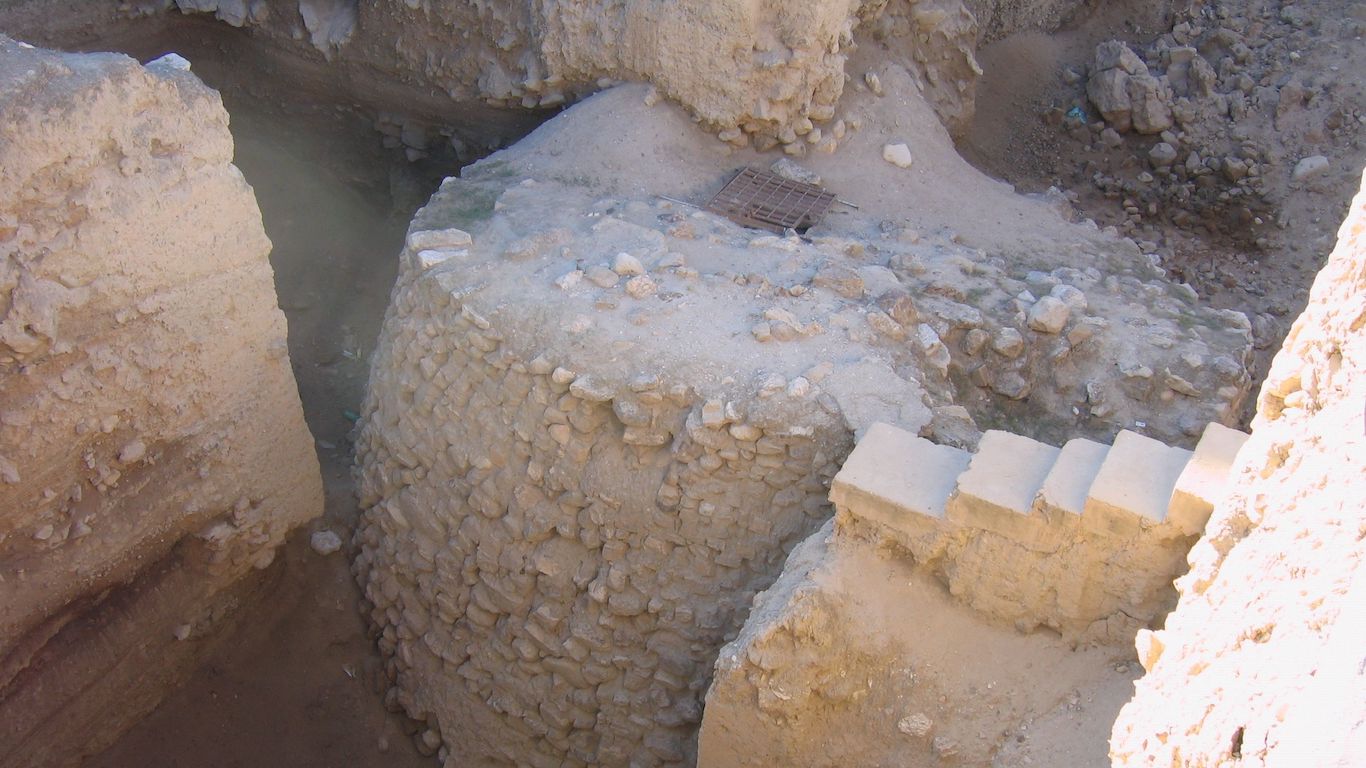
39. Standing Building
> Oldest: Tower of Jericho
> Approximate Date: 9,000 B.C.
> Location: West Bank, Palestine
The 11,000-year-old, three-story structure is connected to the ancient walls of Jericho in what is now the West Bank. The Neolithic-period tower was built near where the Bible says Jesus was tempted by Satan. Archaeologists believe the building, which has a staircase, may have been constructed by ancient people to mark the summer solstice and seen as symbolic protection against darkness.
[in-text-ad-2]
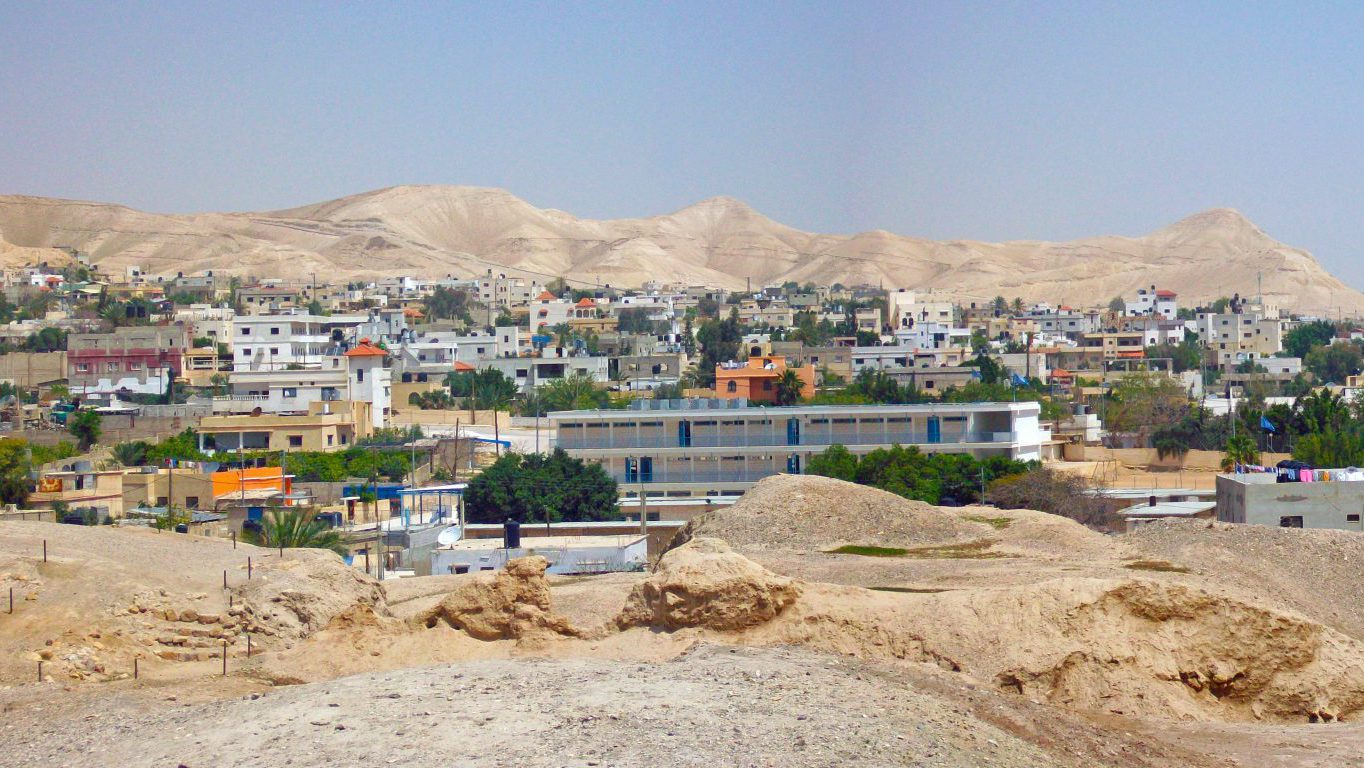
40. City
> Oldest: Jericho
> Approximate Date: 9,000 B.C.
> Location: Palestinian Territories
Though there is some dispute as to which cities are truly the oldest, Jericho seems to have as strong a case for the title as any other place. There is evidence that people first settled in the area that is now known as Jericho close to 11,000 years ago. Archaeologists believe tribes were attracted to the area because of the Jordan River. For the most part, people have continuously lived in Jericho, which is now located in the Palestinian territories on the West Bank.
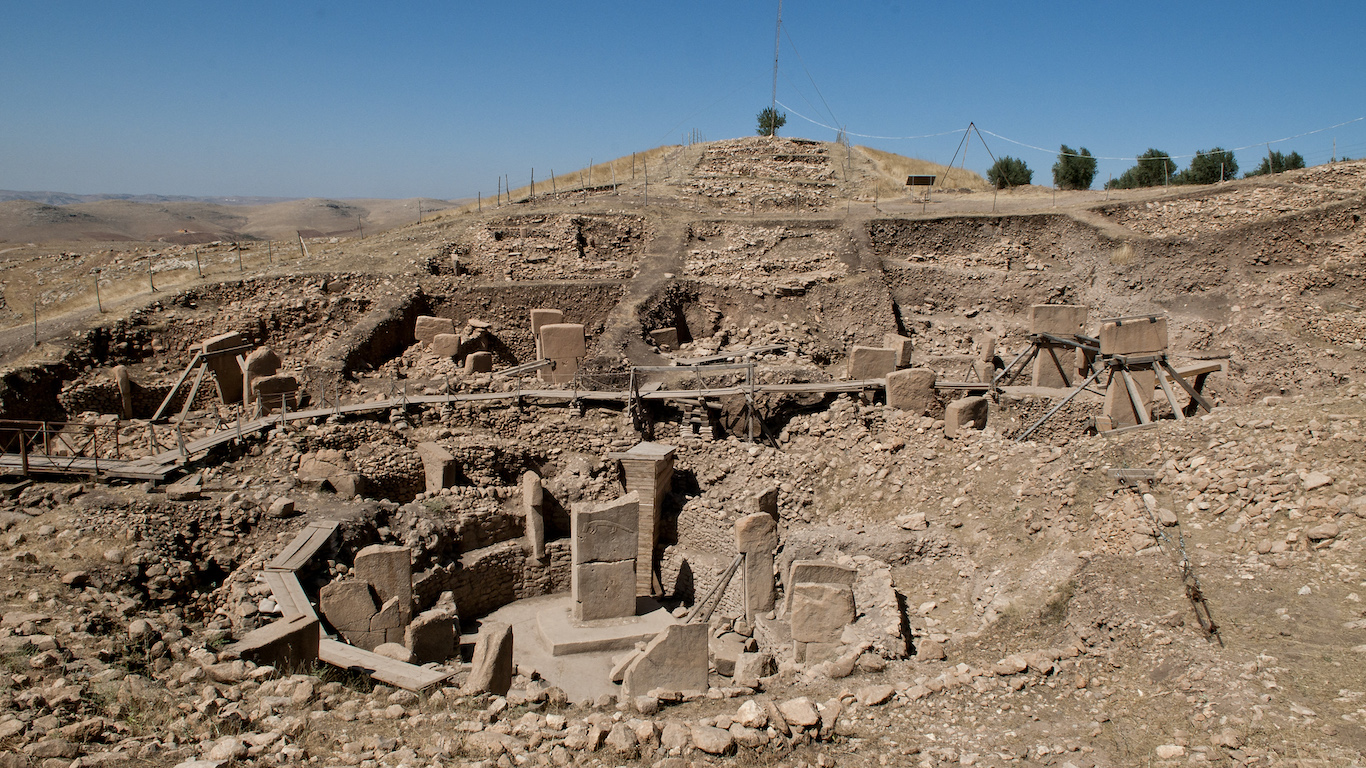
41. Place of Worship
> Oldest: The Göbekli Tepe
> Approximate Date: 9,300 B.C.
> Location: Şanlıurfa, Turkey
Millennia before many of the most common religions of today were founded, worshippers attended the Göbekli Tepe in what is now Turkey. The site may have been constructed as a place to worship the star Sirius, based on its relative position to the star. Despite that hypothesis, it is unclear exactly what religion or belief system the temple actually served.
[in-text-ad]
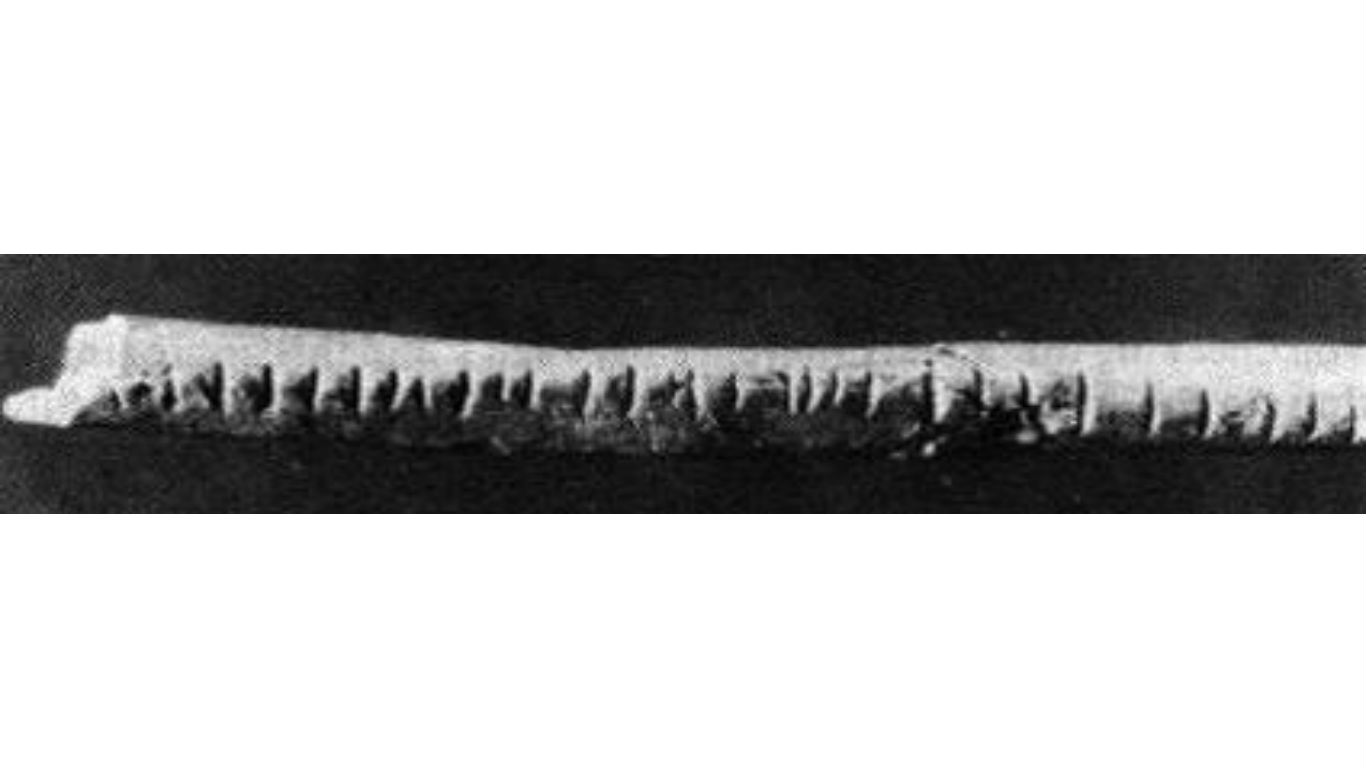
42. Measuring Device
> Oldest: Lebombo bone
> Approximate Date: 35,000 B.C.
> Location: Swaziland
Lebombo bone, found in the Lebombo Mountains in Swaziland, is dated back about 35,000 years ago and is believed to be the oldest measuring device. The instrument has 29 markings and was created from the fibula — the calf bone — of a baboon. Scientists think the device could have been used to gauge menstrual or lunar cycles.
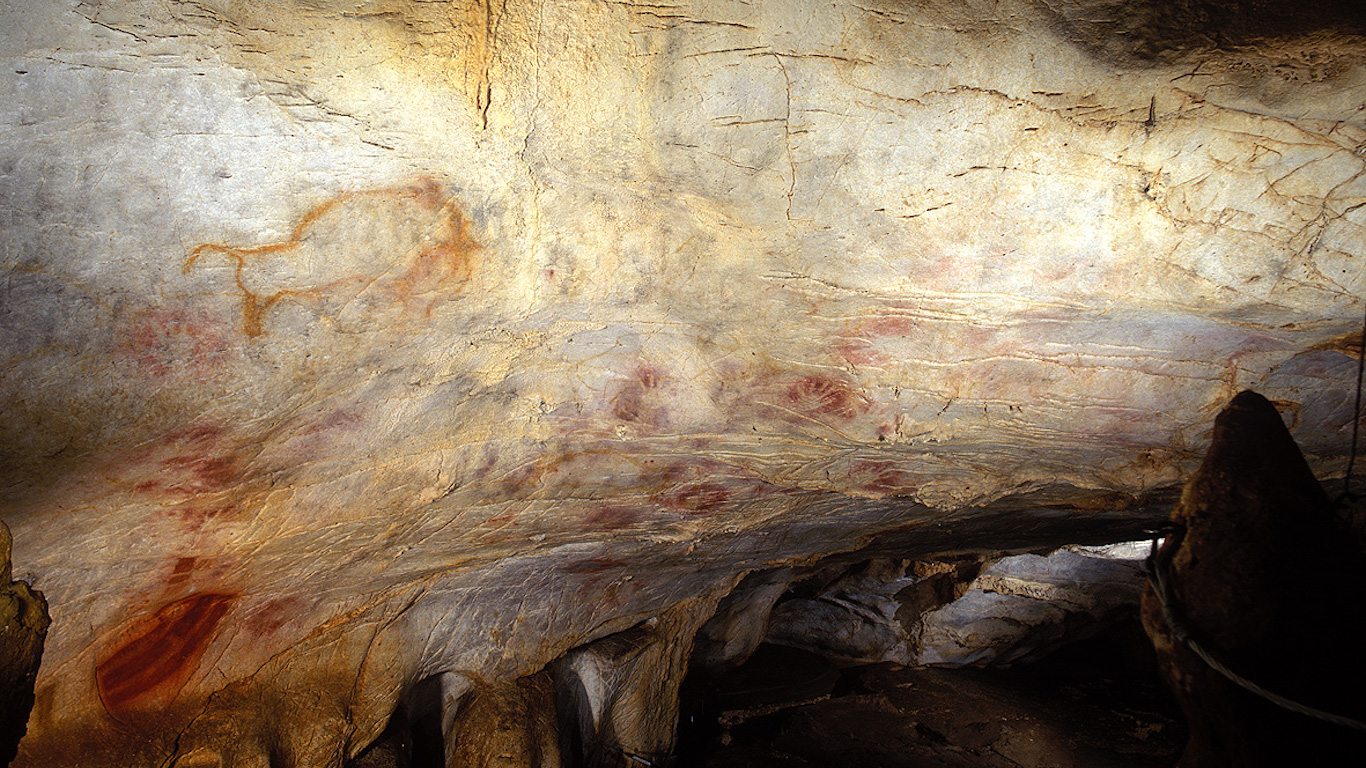
43. Cave Painting
> Oldest: El Castillo Cave Paintings
> Approximate Date: 40,800 B.C.
> Location: El Castillo, Spain
The country that was home to Picasso and El Greco is also believed to be home to the world’s oldest cave paintings. A study by the University of Bristol, based on carbon-dating results in 2012, determined that the prehistoric dots and crimson-hued stencils in a cave on Spain’s northern coast are more than 40,000 years old. Archaeologists think Neanderthals could be the oldest painters. Neanderthals are thought to have lived in Europe until about 30,000 or 40,000 years ago.
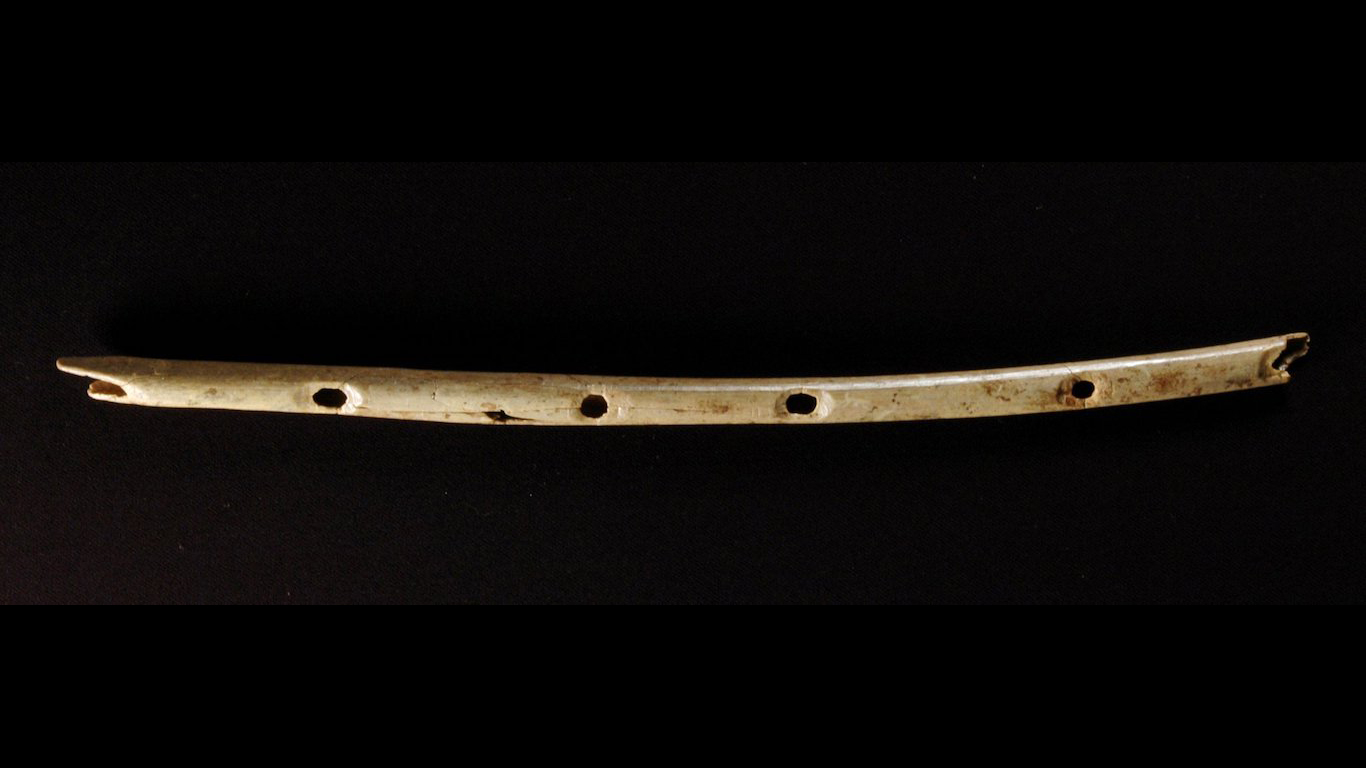
44. Musical Instrument
> Oldest: Bone Flute
> Approximate Date: 41,000-40,000 B.C.
> Location: Hohle Fels Cave, Germany
More than 40,000 years before the dawn of recorded music, people were already crafting their own tunes. Scientists discovered flutes made out of mammoth bones in present-day Germany. They used radiocarbon tests to date the flutes at 42,000-43,000 years old. Though early humans probably didn’t have enough to make a symphony, scientists say the discovery proved that the Danube River area in Germany was a key place for humans to develop.
[in-text-ad-2]
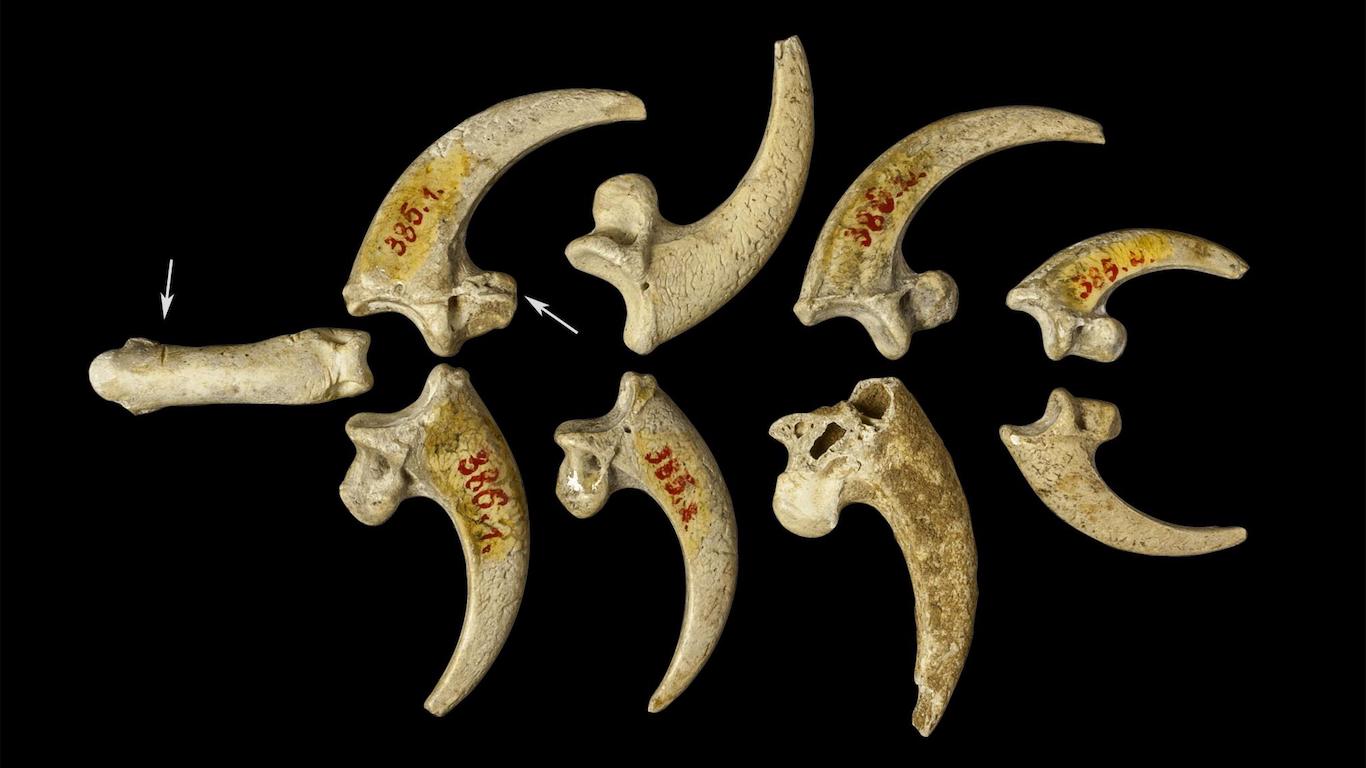
45. Jewelry
> Oldest: Krapina Eagle Talon Jewelry
> Approximate Date: 128,000 B.C.
> Location: Krapina site, Croatia
Found in Krapina, Croatia two years ago, the oldest jewelry is about 130,000 years old. This prehistoric bling, found at a Neanderthal site, is in the form of a necklace or a bracelet of eagle talons. The claws bear evidence of cut marks and polishing. Scientists believe the jewelry was used for ceremonial purposes.
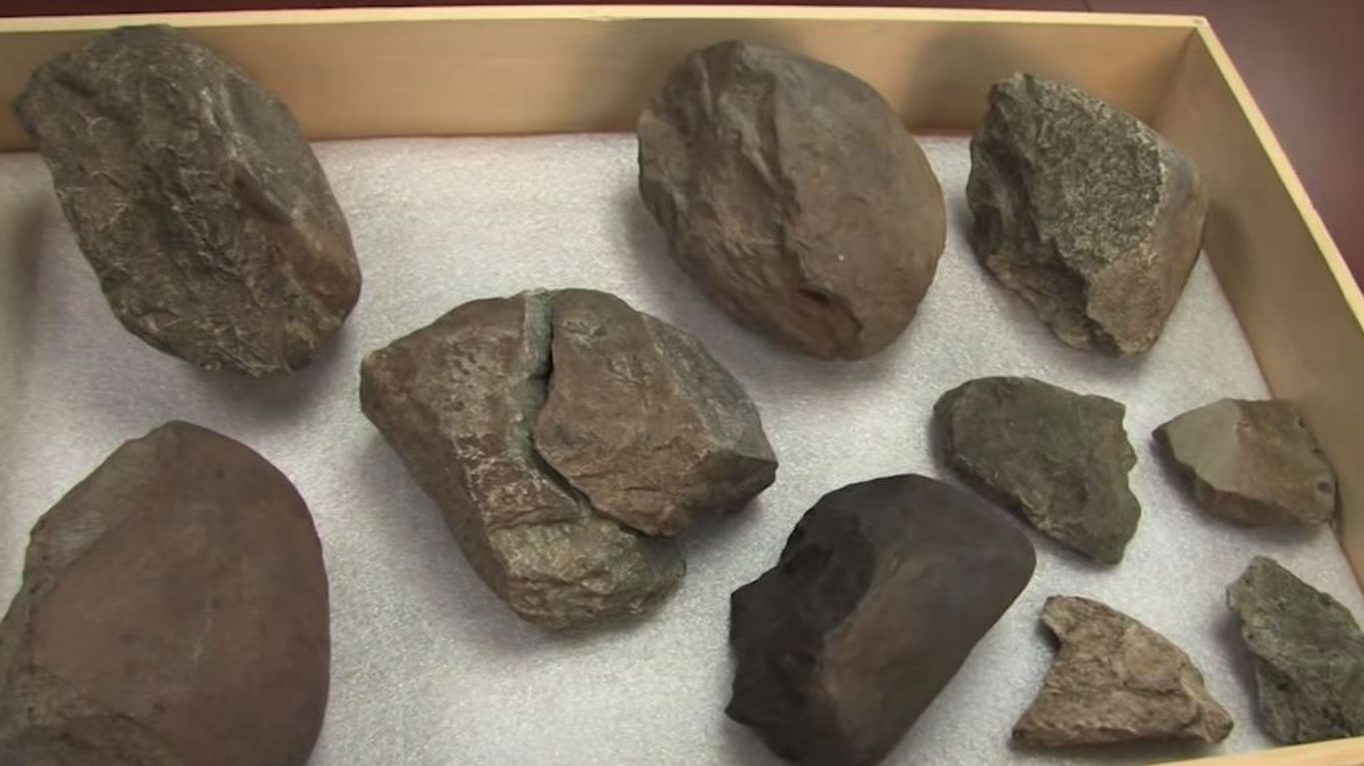
46. Tool
> Oldest: Lomekwi 3 Stone tools
> Approximate Date: 3.3 million B.C.
> Location: Kenya
The oldest tools are made of stone and are 3.3 million years old. This means the tools predate humans and might be evidence of a pre-human species smart enough to make sharp stone tools. The tools were found in Kenya’s northwestern desert. The previously oldest tools were the Oldowan stone tools, which are roughly 2.6 million years old.
[in-text-ad]
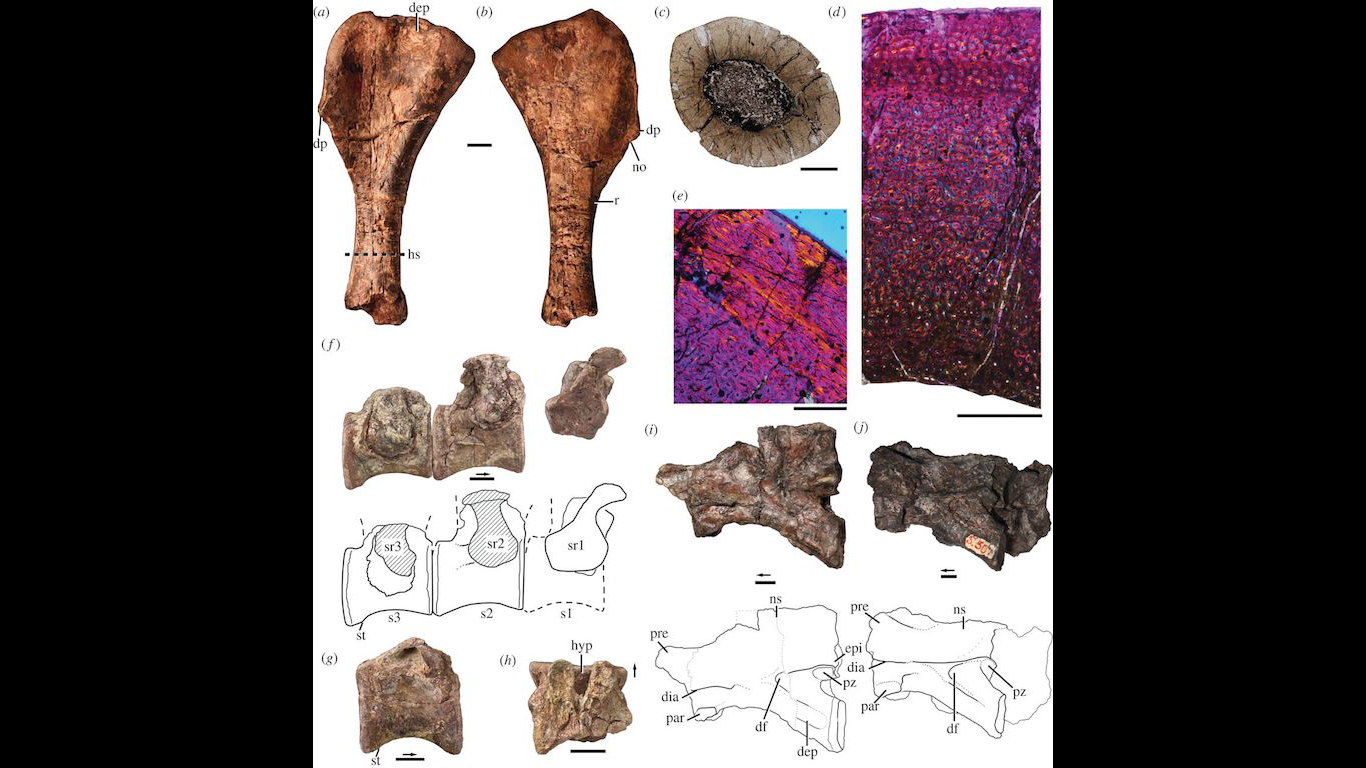
47. Dinosaur Fossil
> Oldest: Nyasasaurus Parringtoni Fossil
> Approximate Date: 245-243 Million B.C.
> Location: Ruhuhu Basin, southern Tanzania
The fossil discovery of the Nyasasaurus Parringtoni gave scientists more clues about when exactly dinosaurs appeared on earth. At roughly 245 million years old, Nyasasaurus Parringtoni was about 10 to 15 million years older than any other previously discovered fossil. It’s believed the old dino was 3 feet tall and weighed somewhere between 45 and 135 pounds. Though it is the current oldest fossil, it is quite possible that an even older fossil could be discovered and replace it.
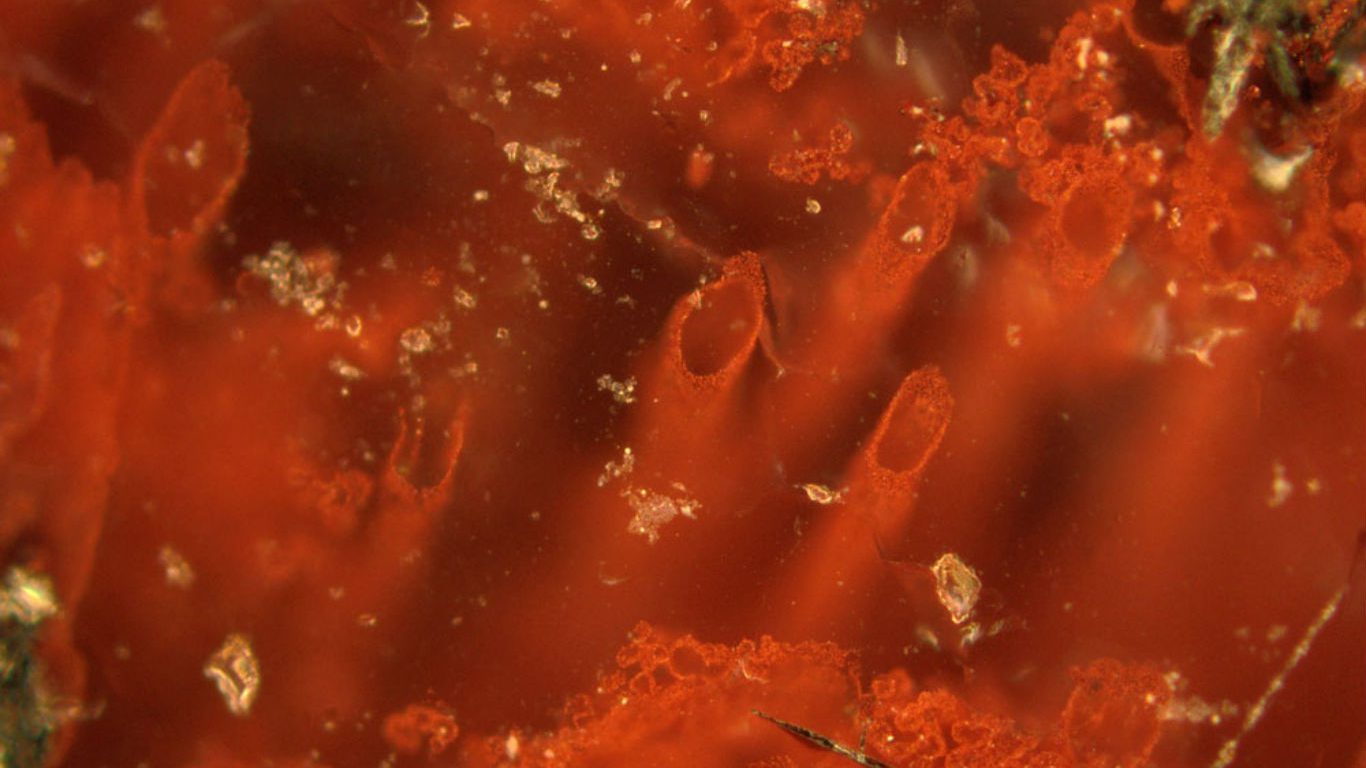
48. Fossil
> Oldest: Iron-Oxidizing Bacteria Fossil
> Approximate Date: 3.8 billion B.C.
> Location: Quebec, Canada
When most people hear the word “fossils,” they likely think of dinosaurs, but scientists can learn a lot from the fossilized remains of organisms of all sizes. In 2017, researchers announced they had discovered tiny bacteria fossils in layers of quartz found in Canada that are believed to be at least 3.8 billion years old. Scientists believe these fossils can help us learn about the very first lifeforms that took shape after Earth formed.
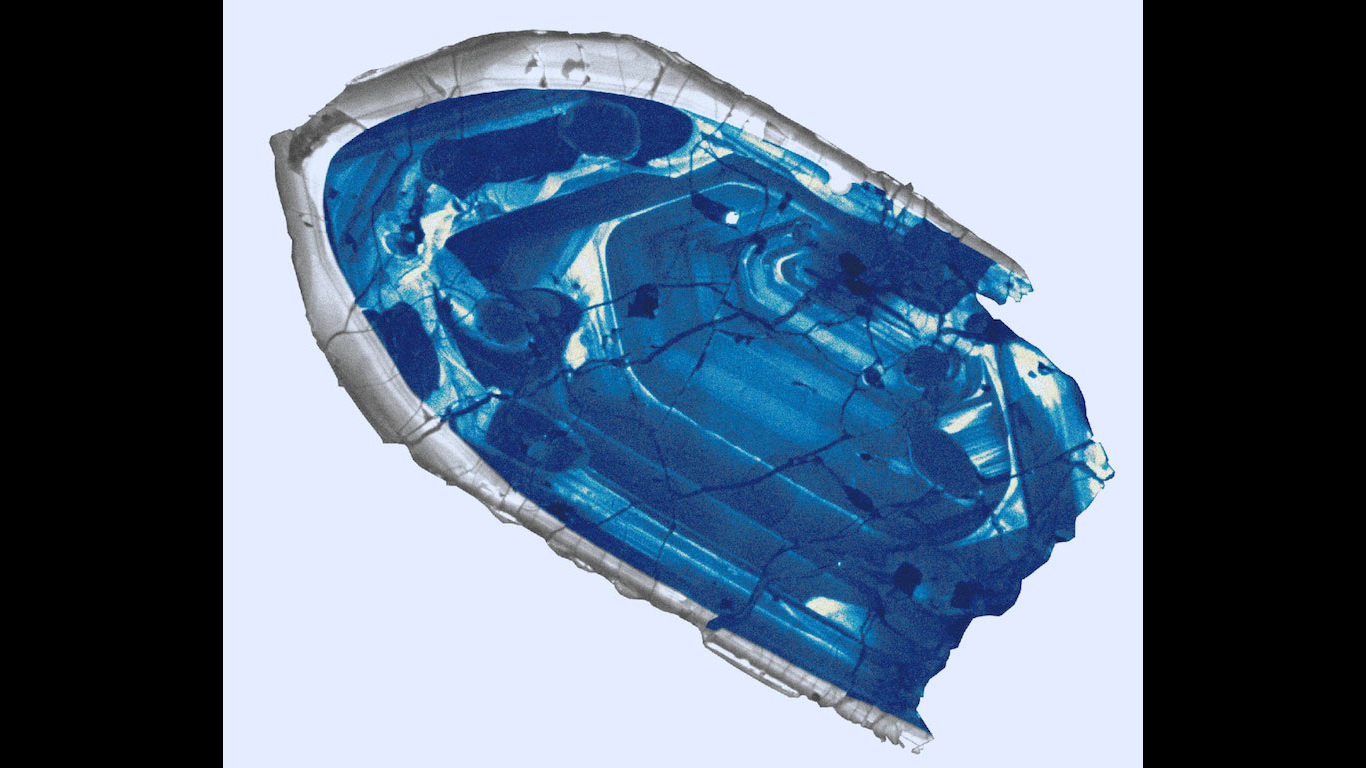
49. Mineral
> Oldest: The Jack Hills Zircon
> Approximate Date: 4.4 billion B.C.
> Location: Jack Hills, Australia
The oldest known materials of any kind on the planet are zircon crystals found in western Australia’s Jack Hills region that are 4.4 billion years old. Elements in these zircons suggest they came from water-rich, granite-like rocks. The presence of quartz as well as the result of isotopic studies of the materials suggests that continental crust was forming very early in Earth’s history and that tectonic activity was occurring as well.
[in-text-ad-2]

50. Star
> Oldest: SMSS J031300.36-670839.3
> Approximate Date: 13.6 billion B.C.
> Location: Milky Way
It may not have a catchy name, but the star known as SMSS J031300.36-670839.3 is one of the most significant astronomical discoveries of all time. The star, which resides in the Milky Way along with us, is roughly 13.6 billion years old, which is estimated to be just 100 million years younger than the universe itself. Australian scientists were able to determine the star’s age by finding out how much iron it contains. Since iron levels drop as the age of the star rise, they could date this ancient star.
Let’s face it: If your money is just sitting in a checking account, you’re losing value every single day. With most checking accounts offering little to no interest, the cash you worked so hard to save is gradually being eroded by inflation.
However, by moving that money into a high-yield savings account, you can put your cash to work, growing steadily with little to no effort on your part. In just a few clicks, you can set up a high-yield savings account and start earning interest immediately.
There are plenty of reputable banks and online platforms that offer competitive rates, and many of them come with zero fees and no minimum balance requirements. Click here to see if you’re earning the best possible rate on your money!
Thank you for reading! Have some feedback for us?
Contact the 24/7 Wall St. editorial team.